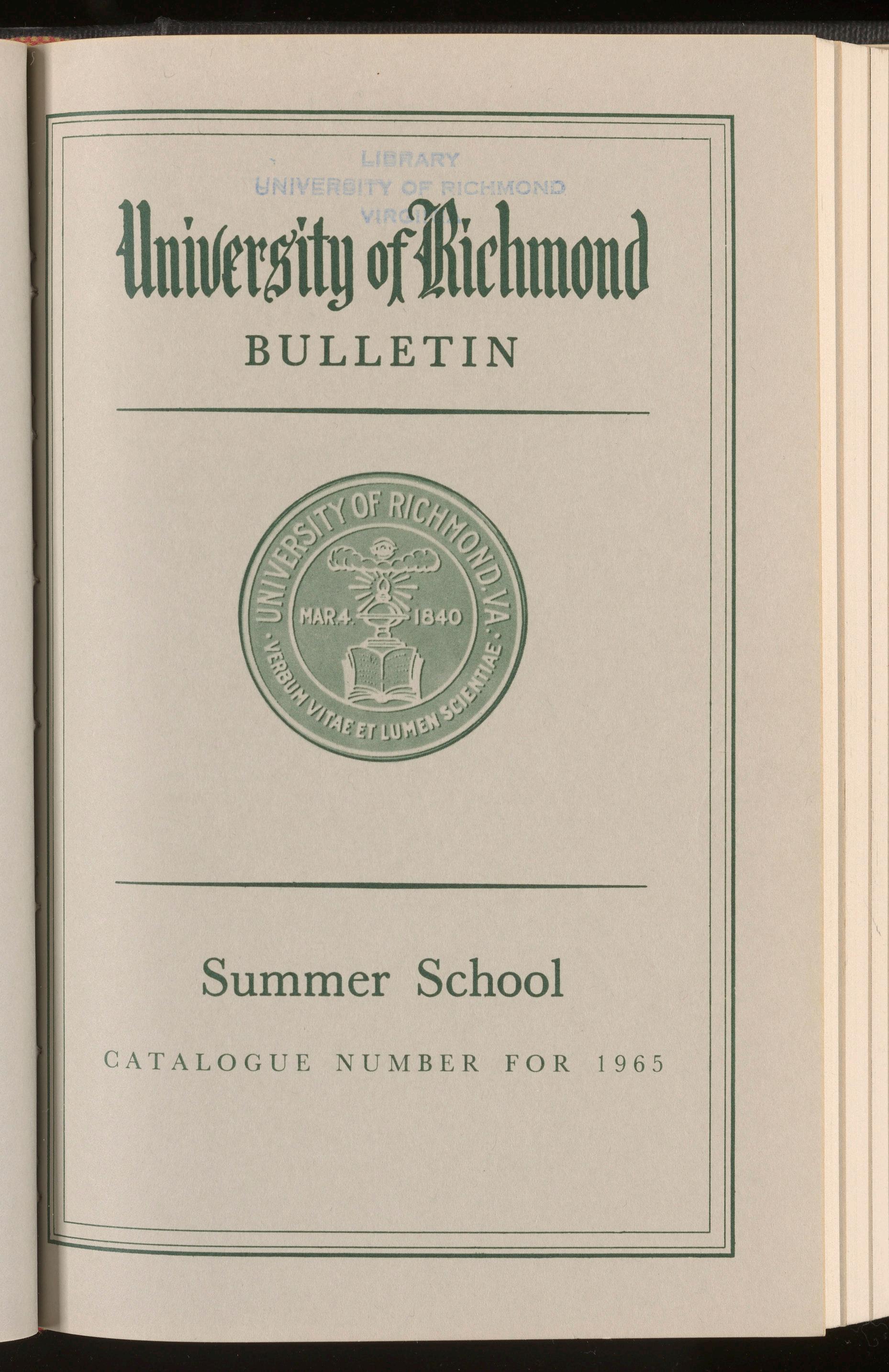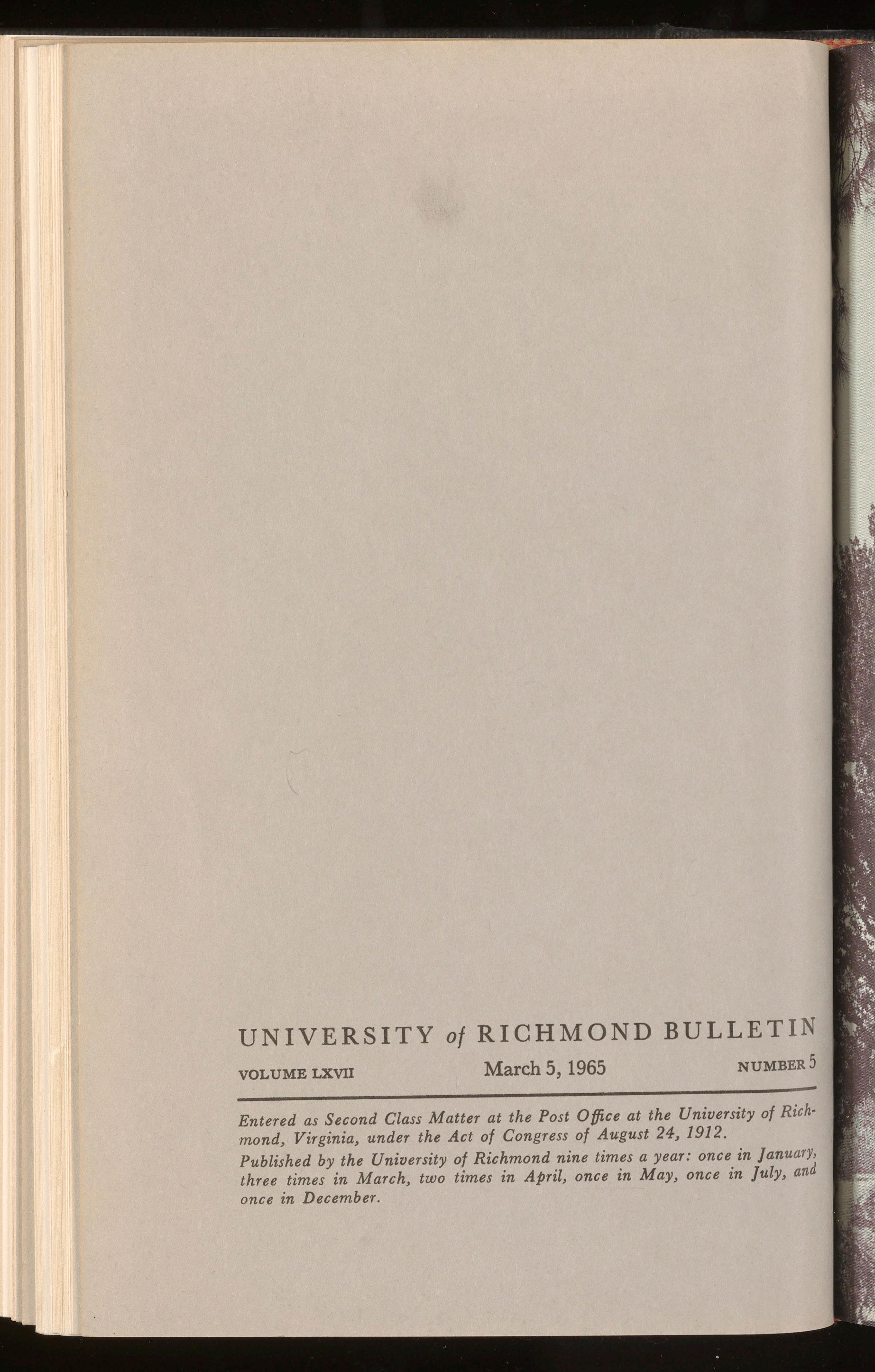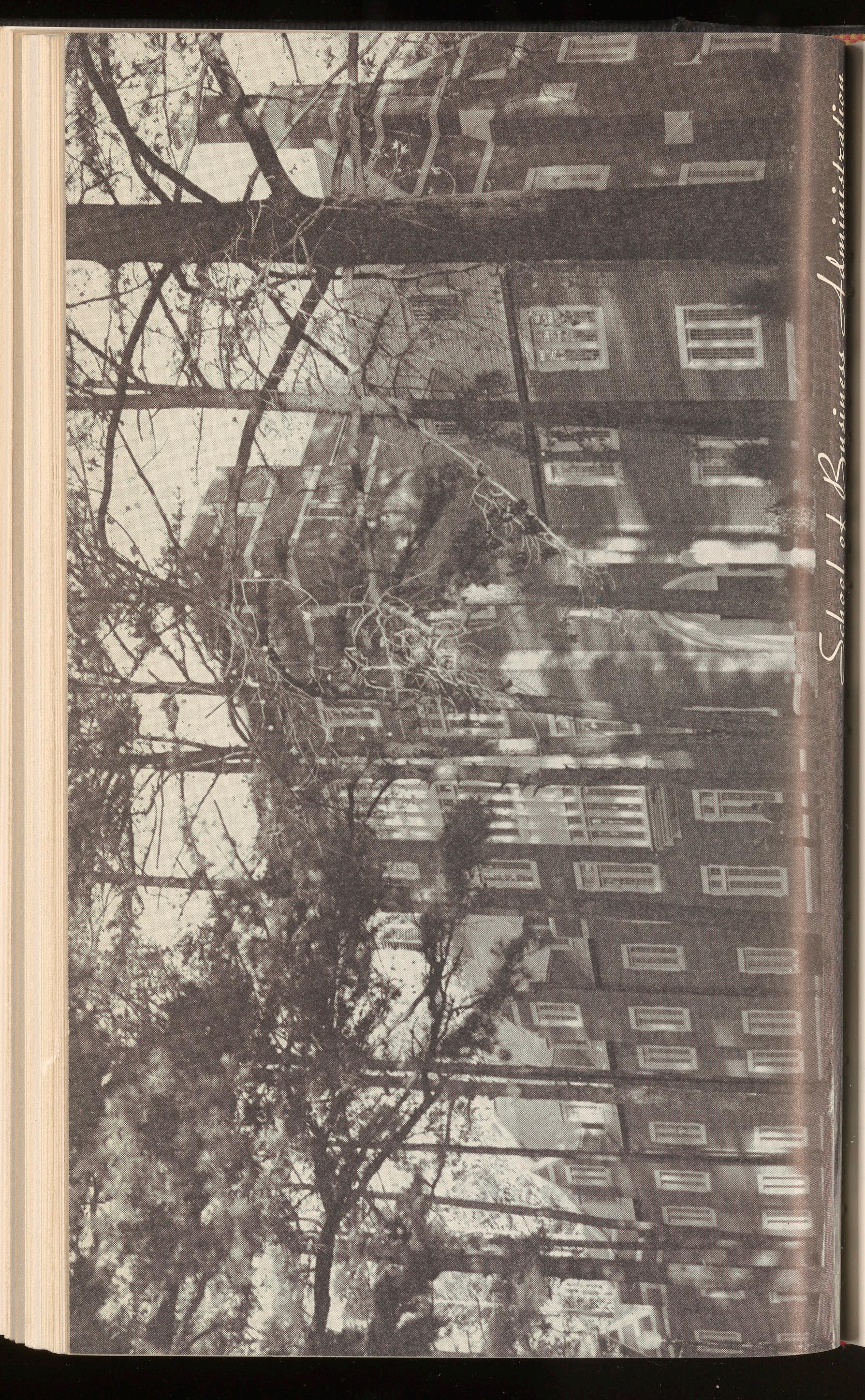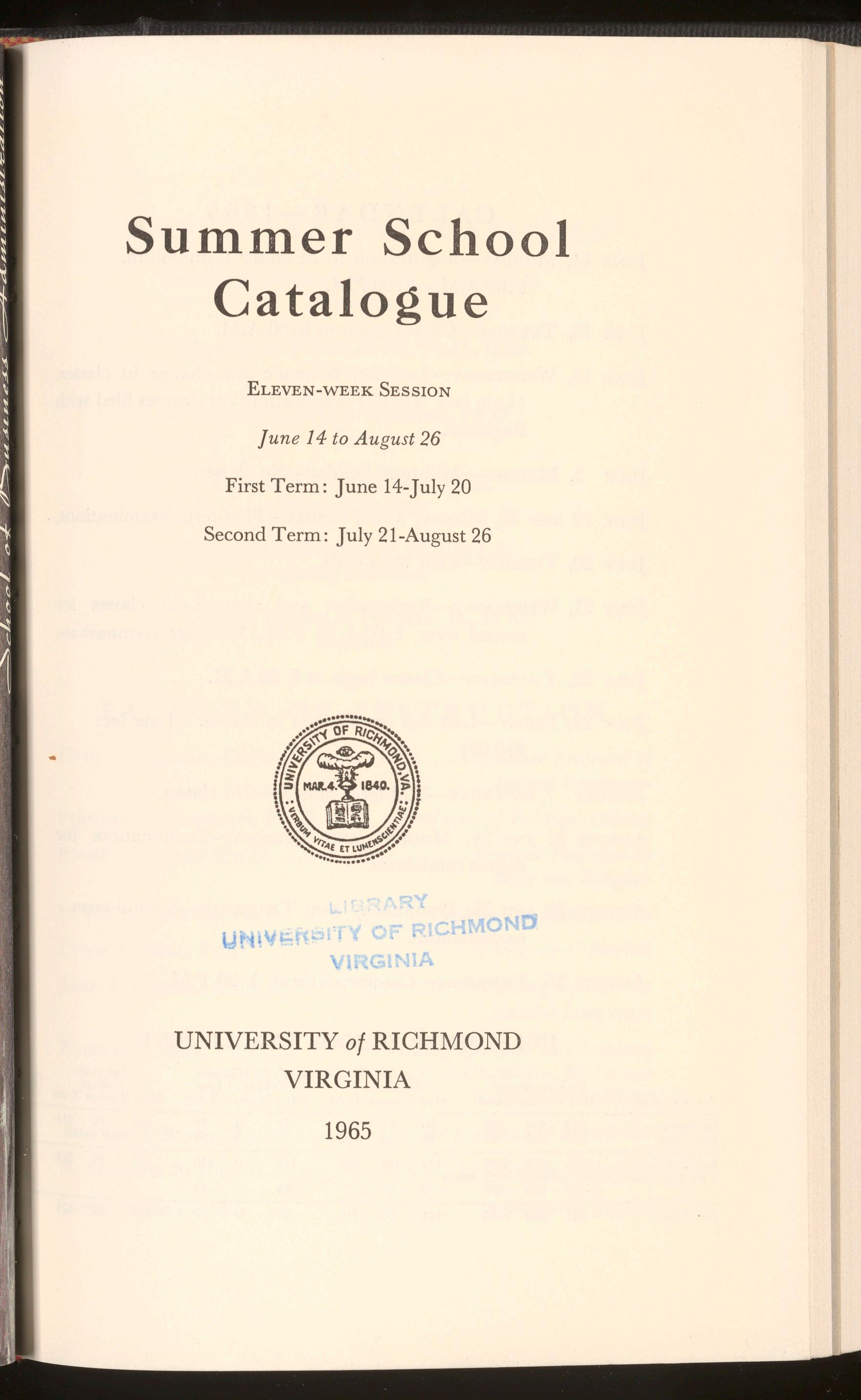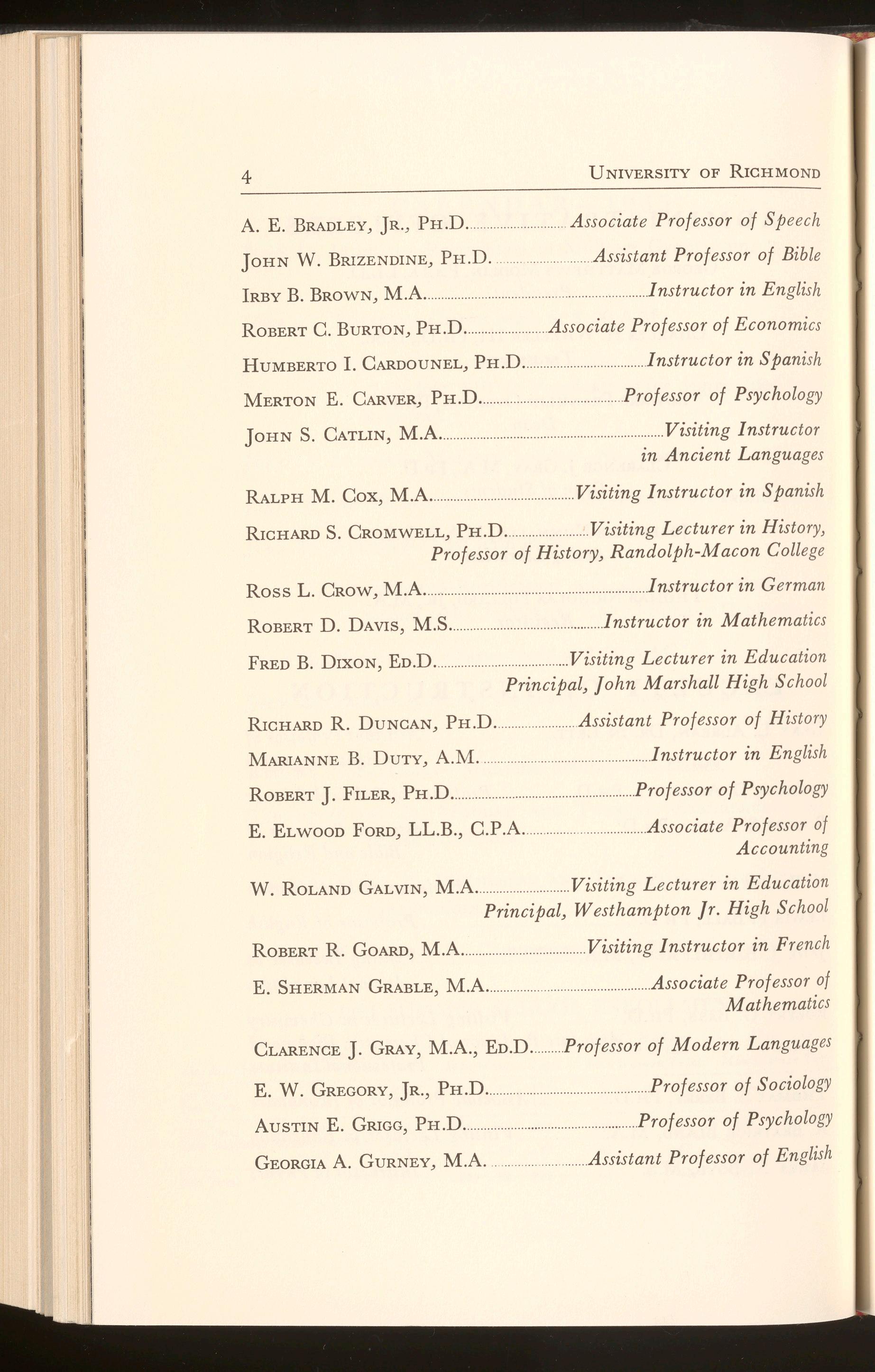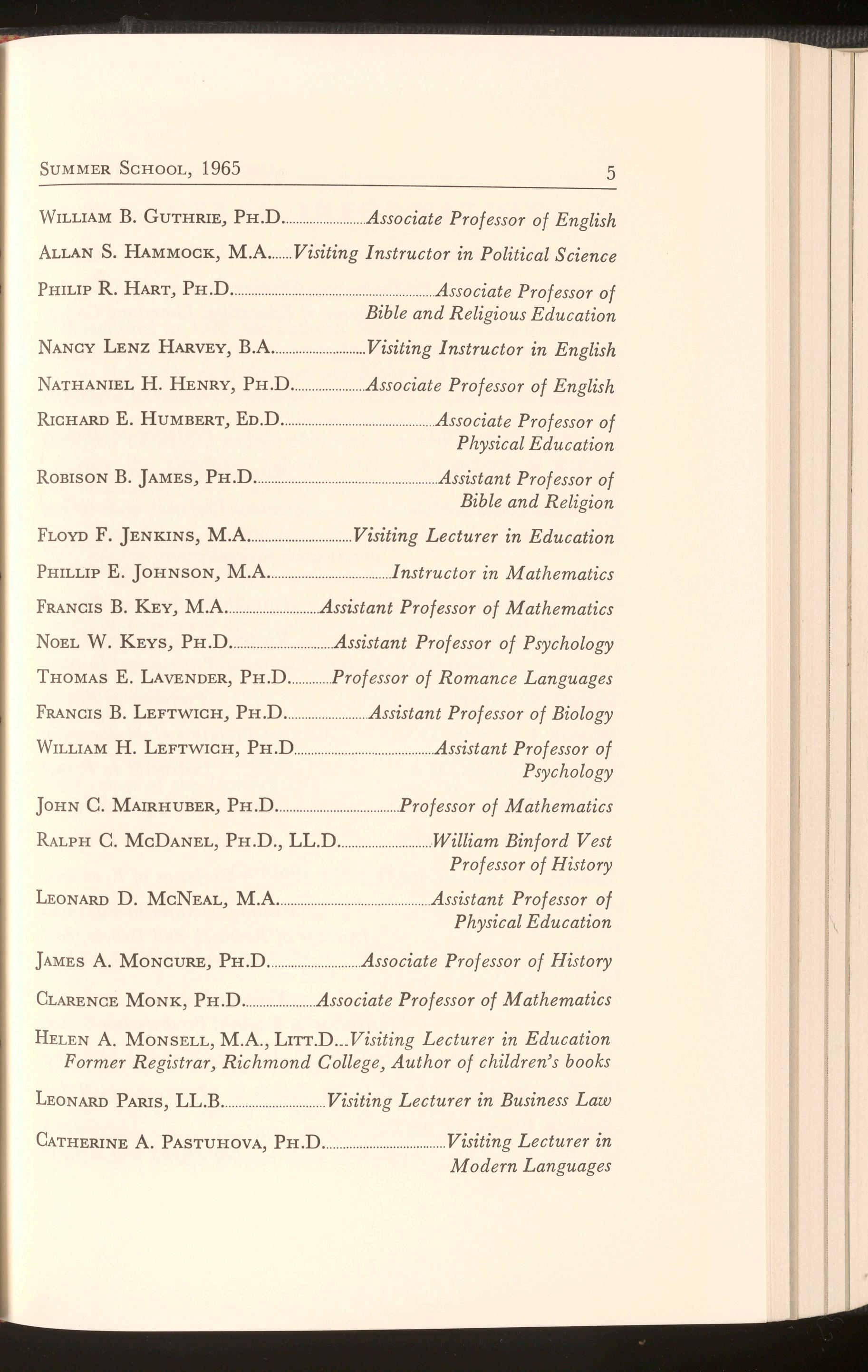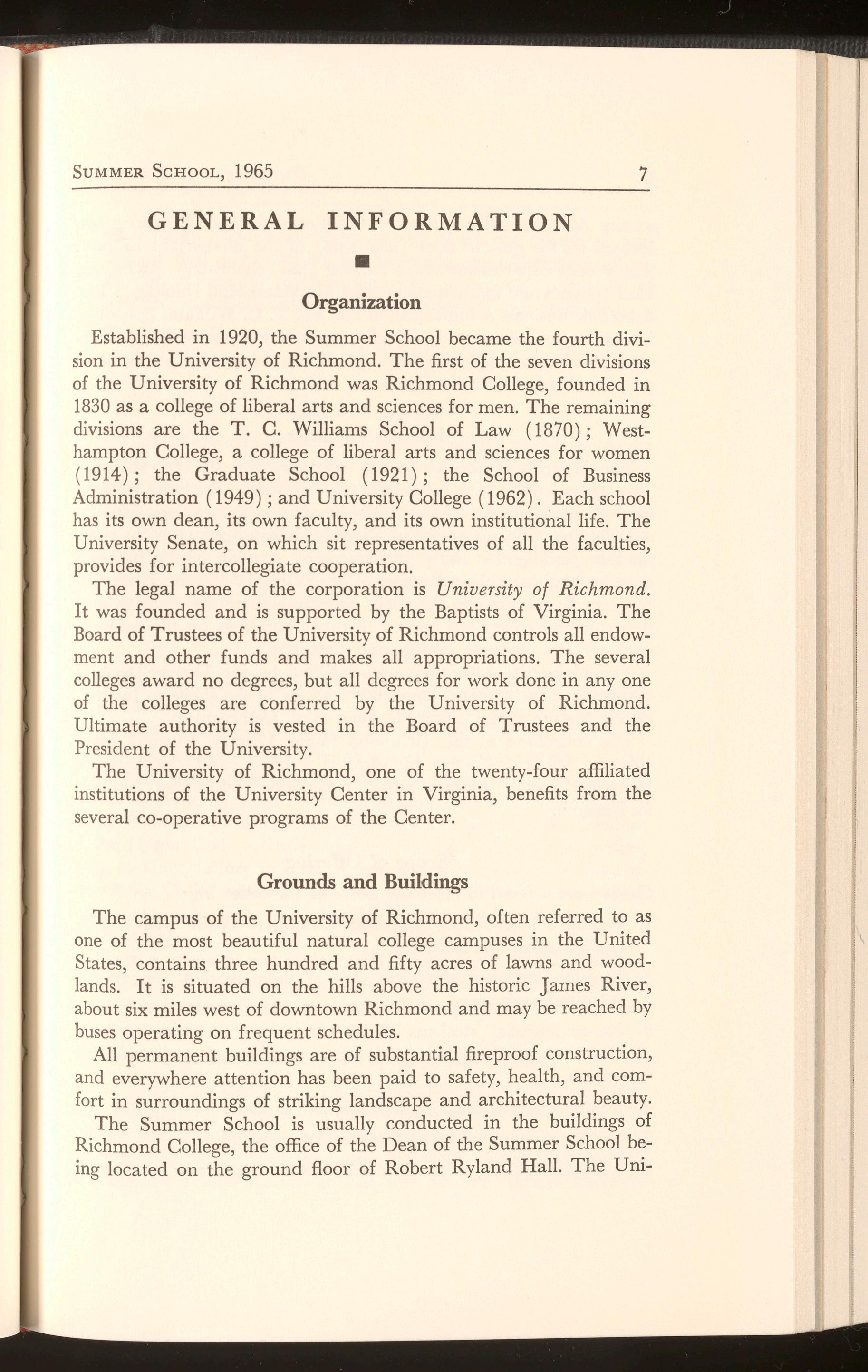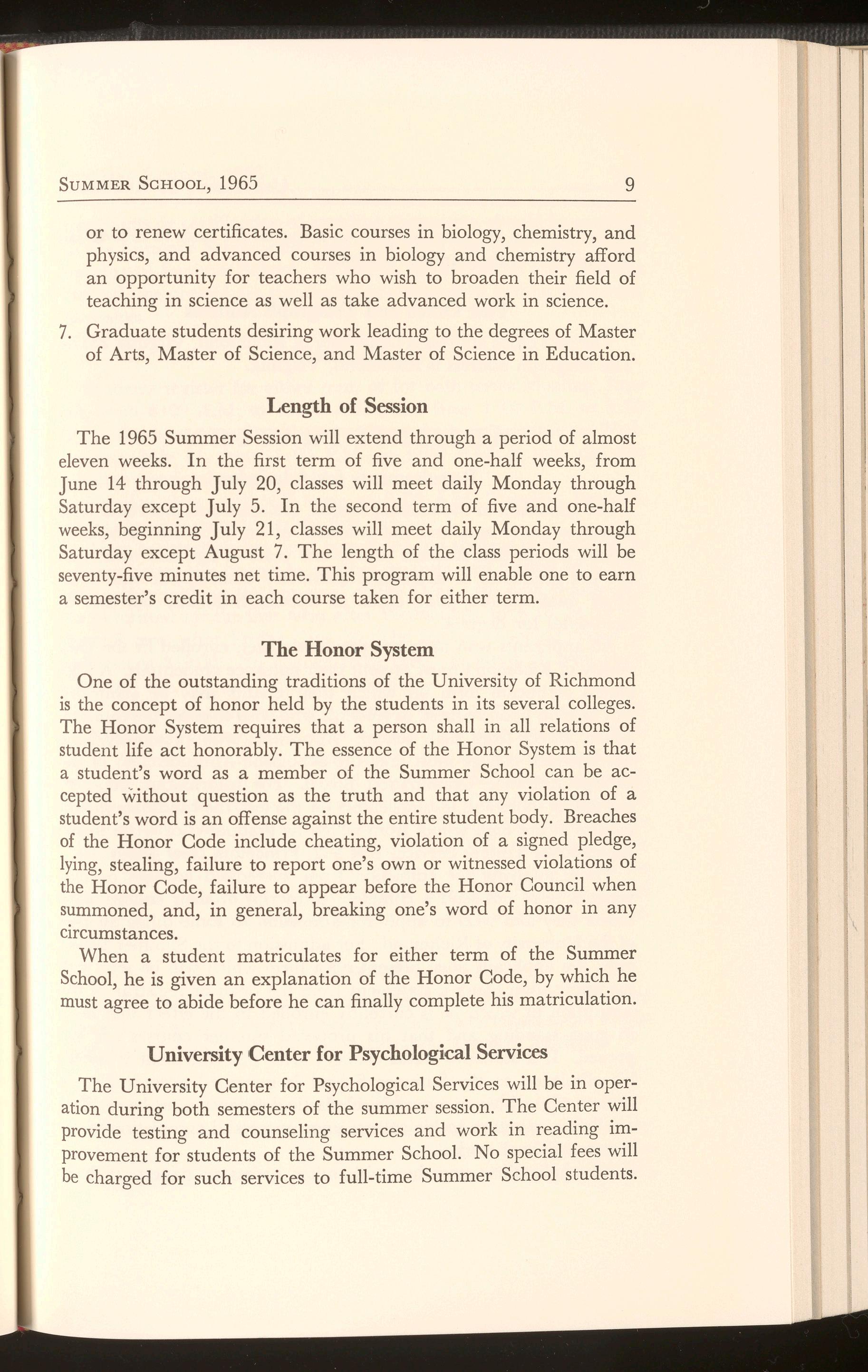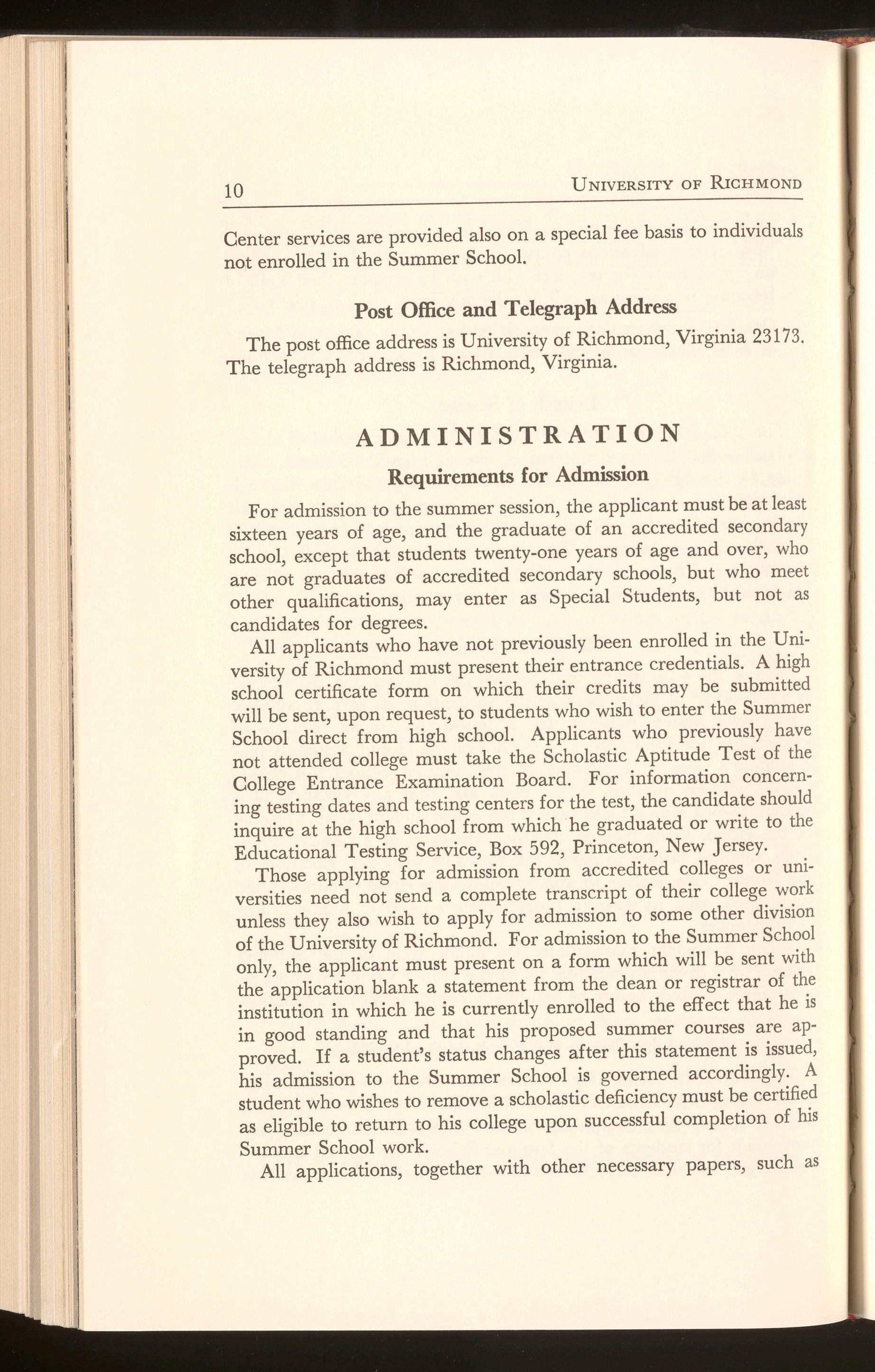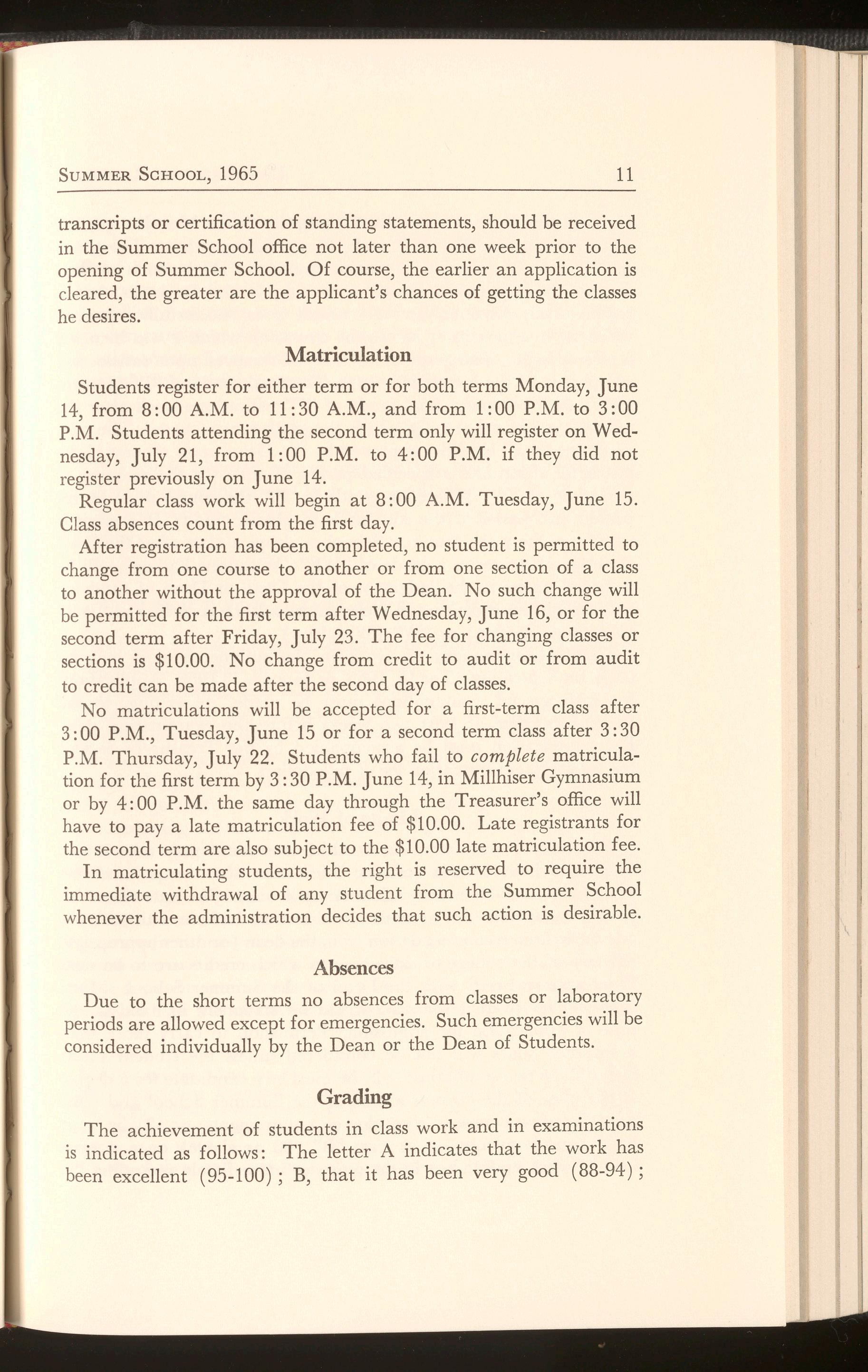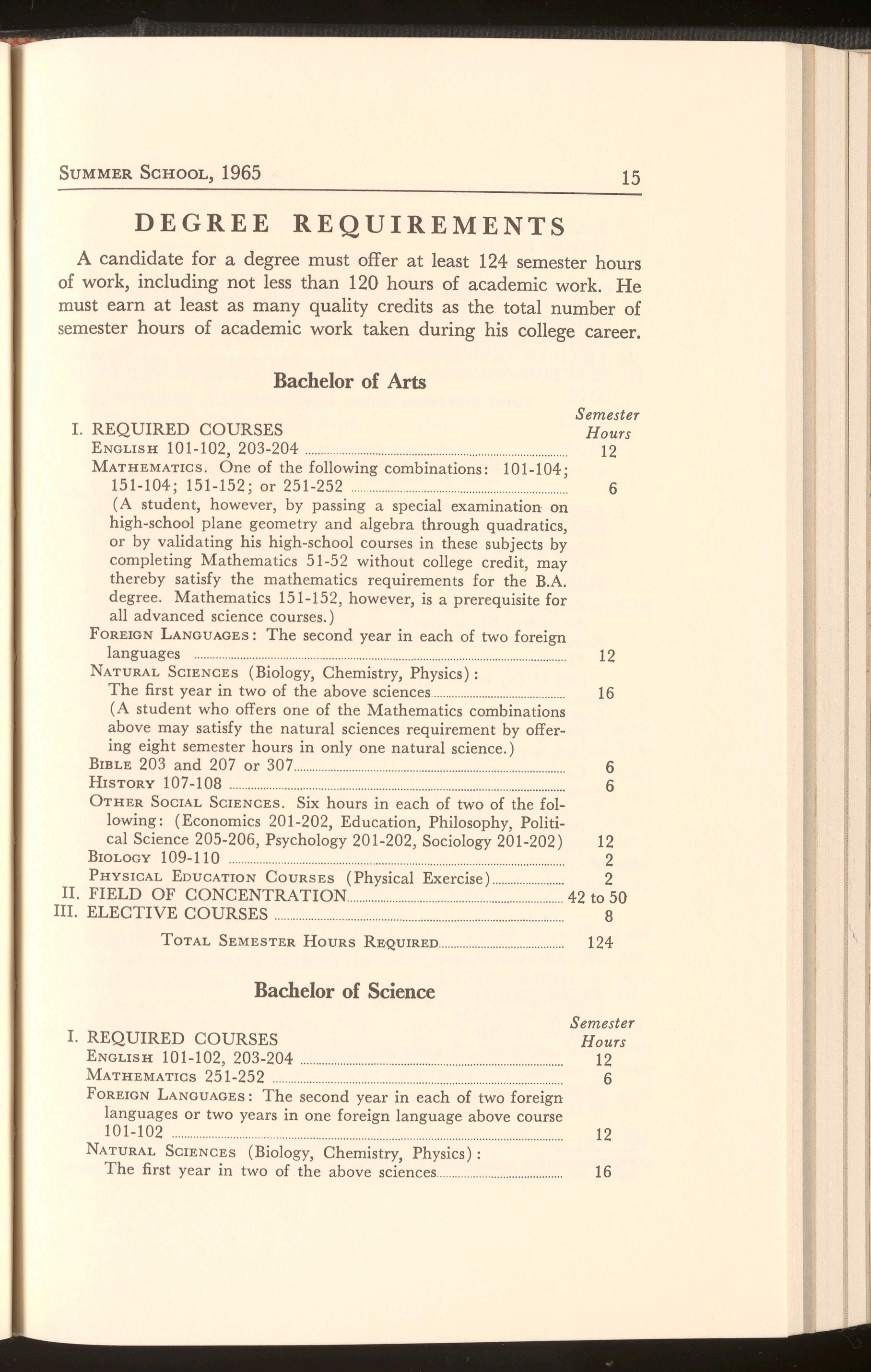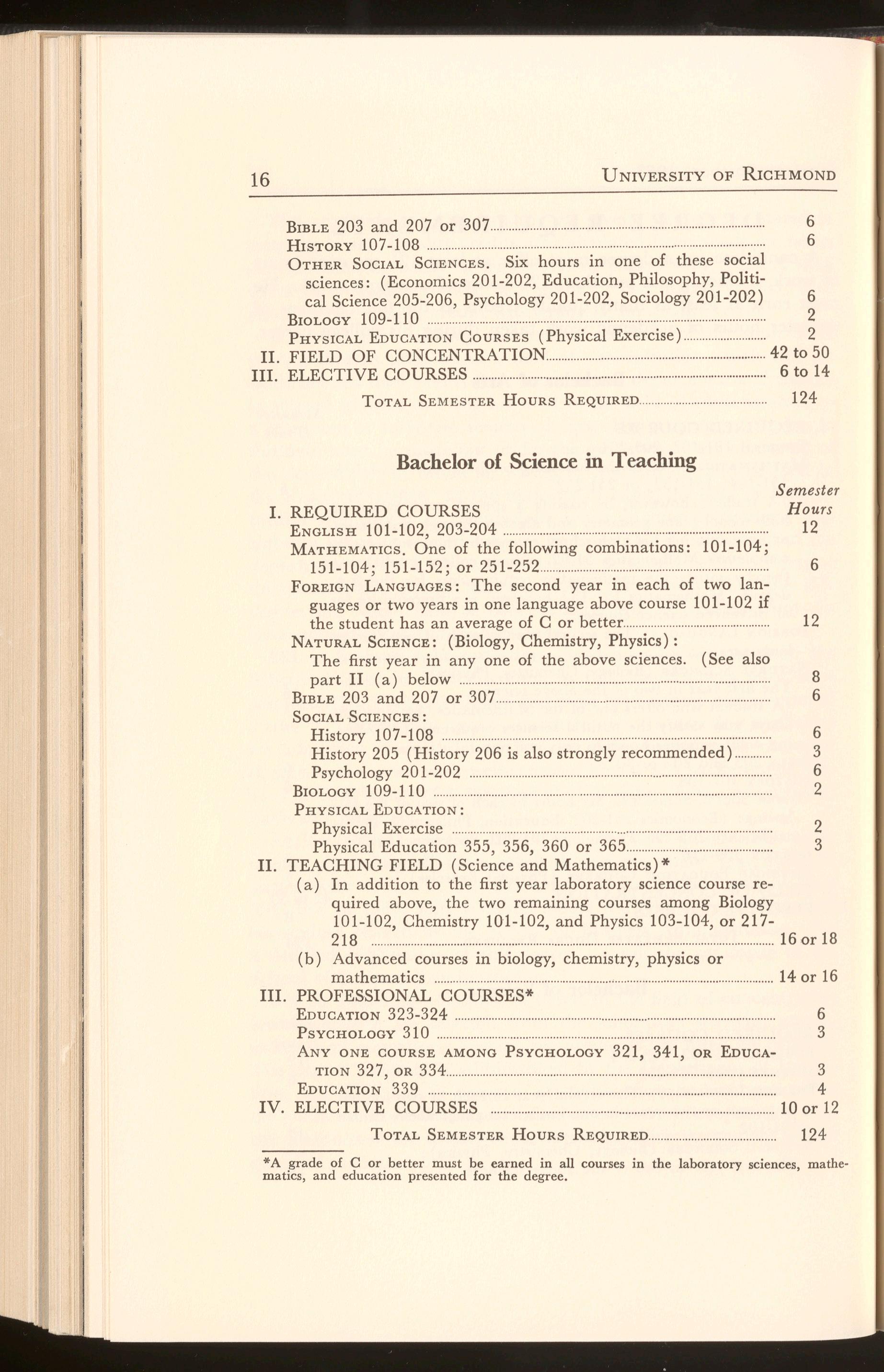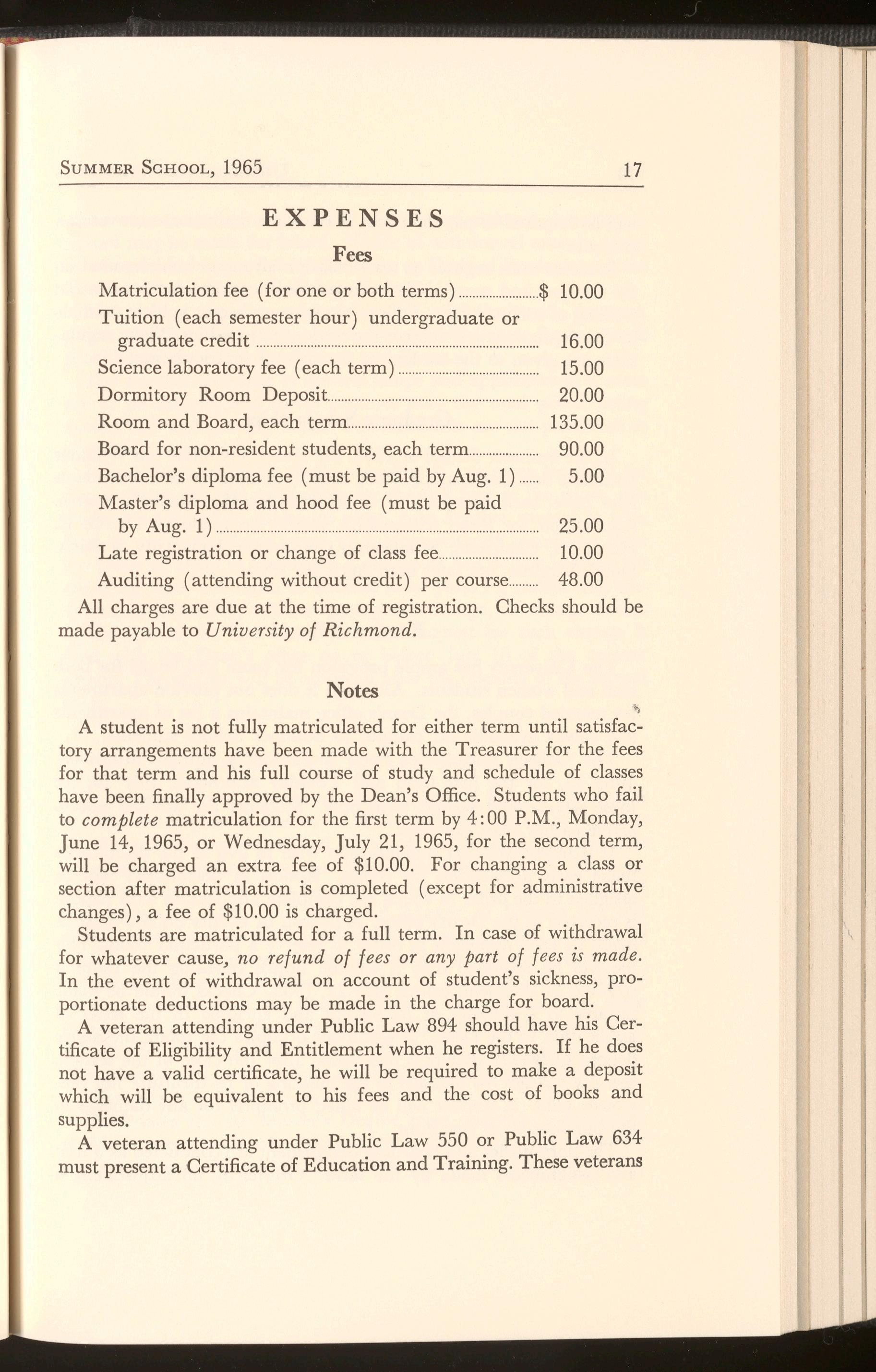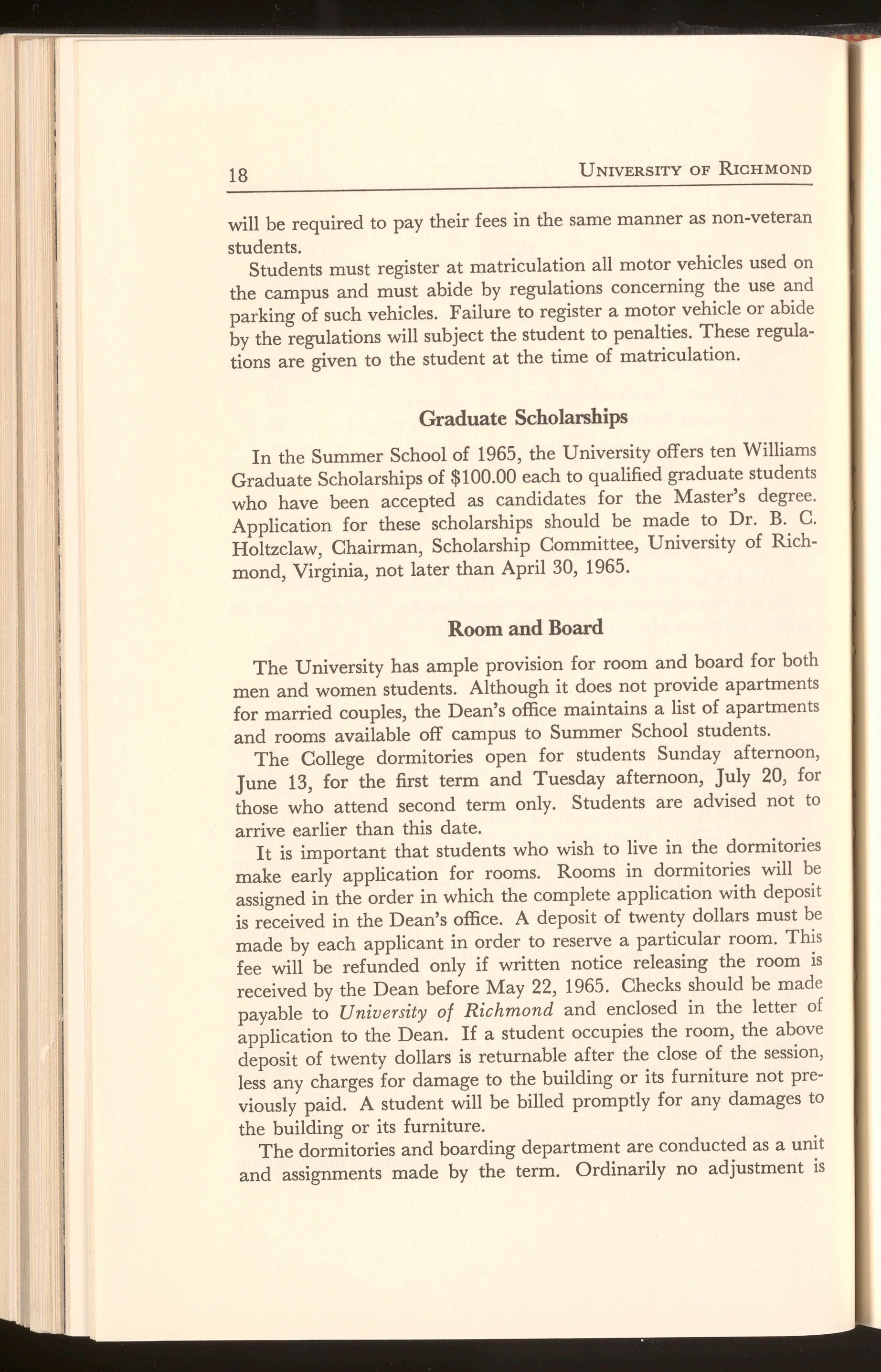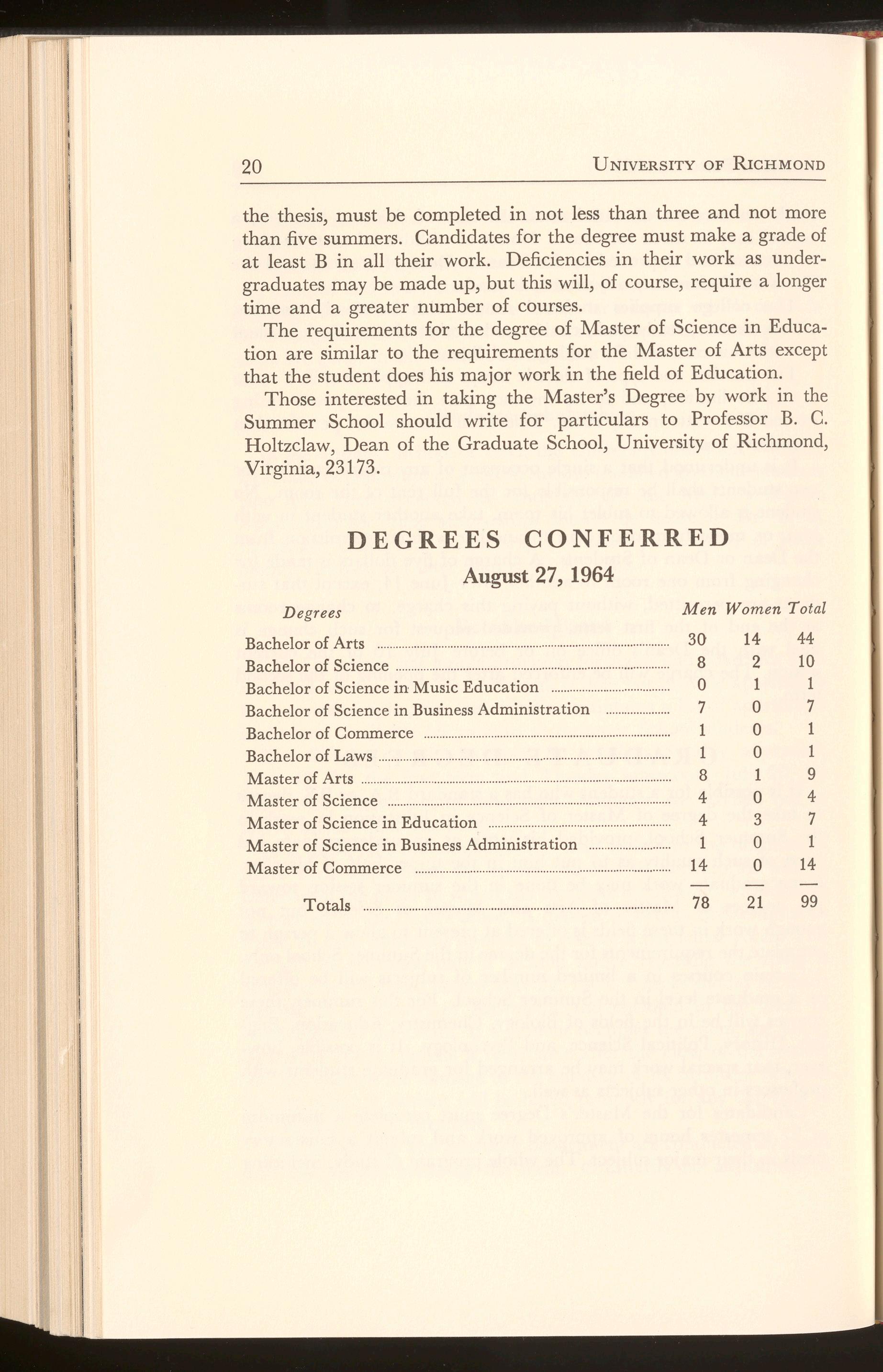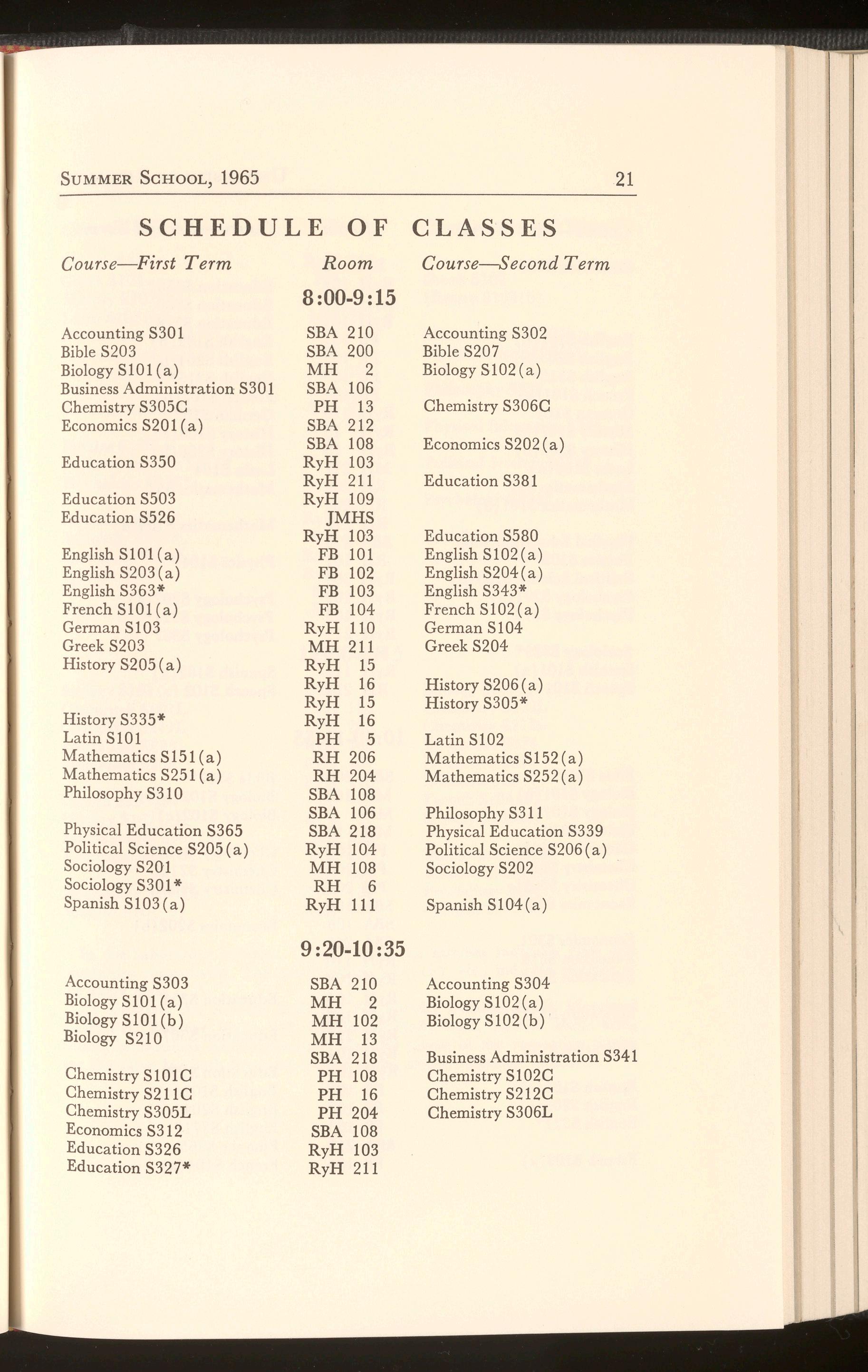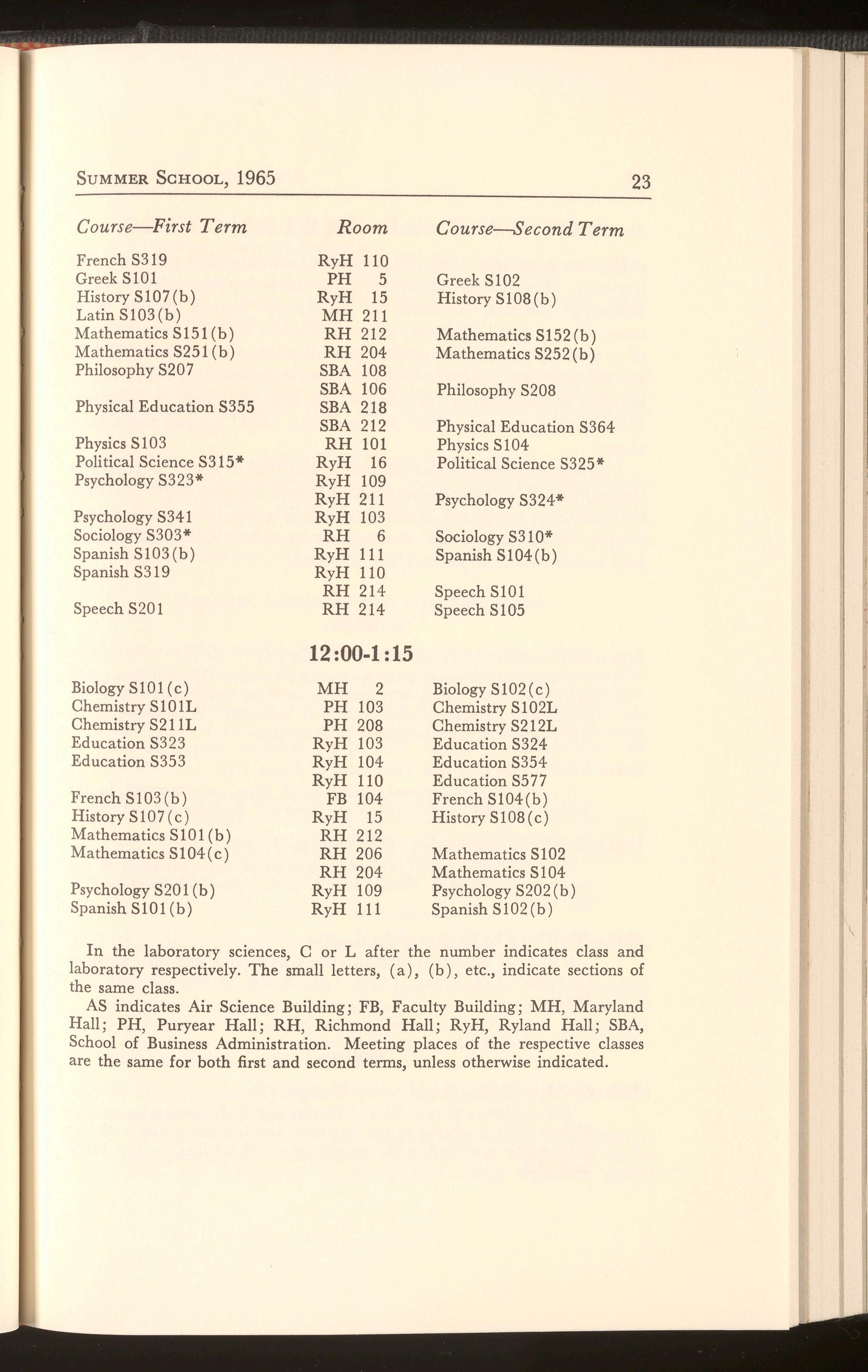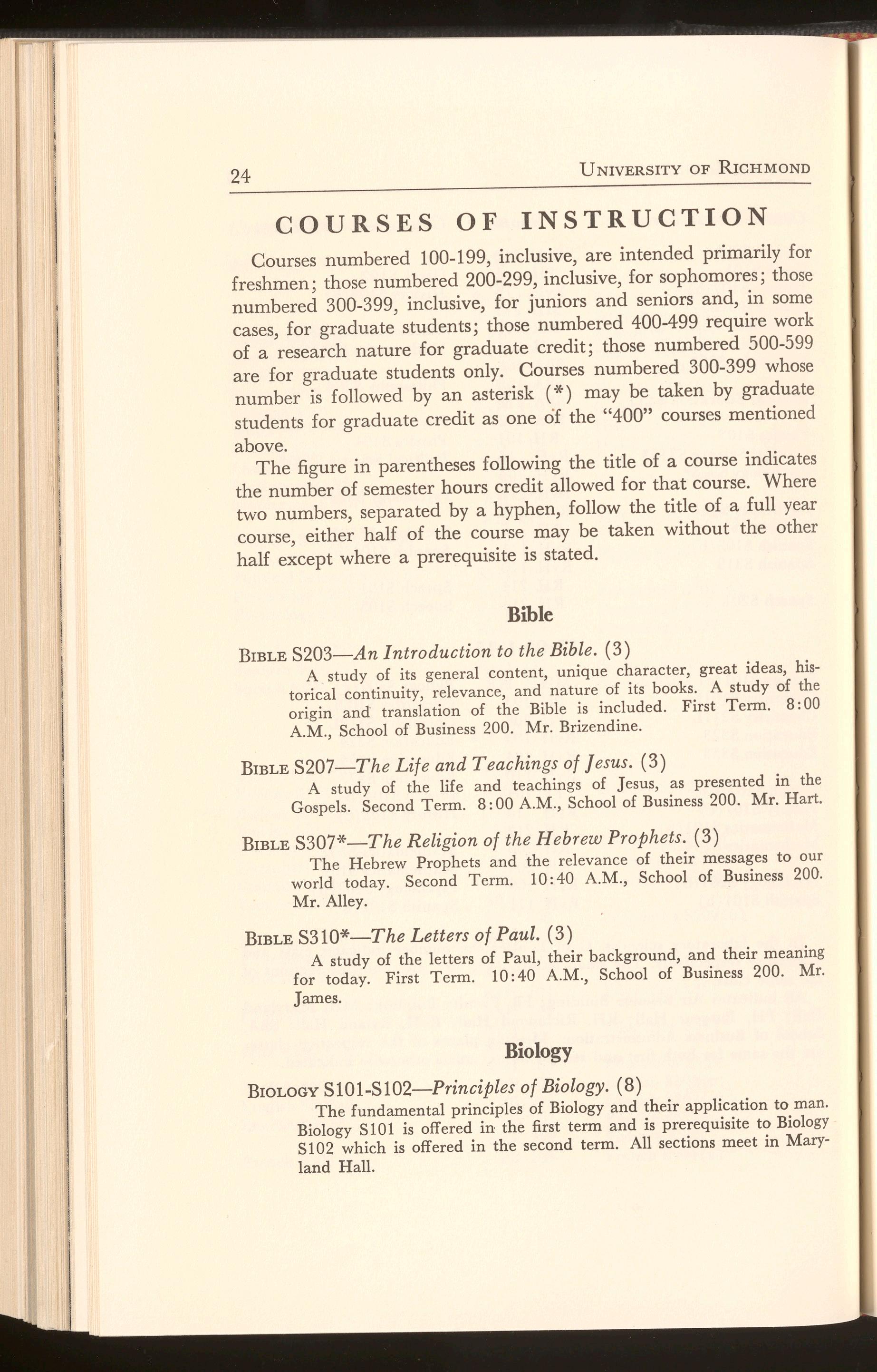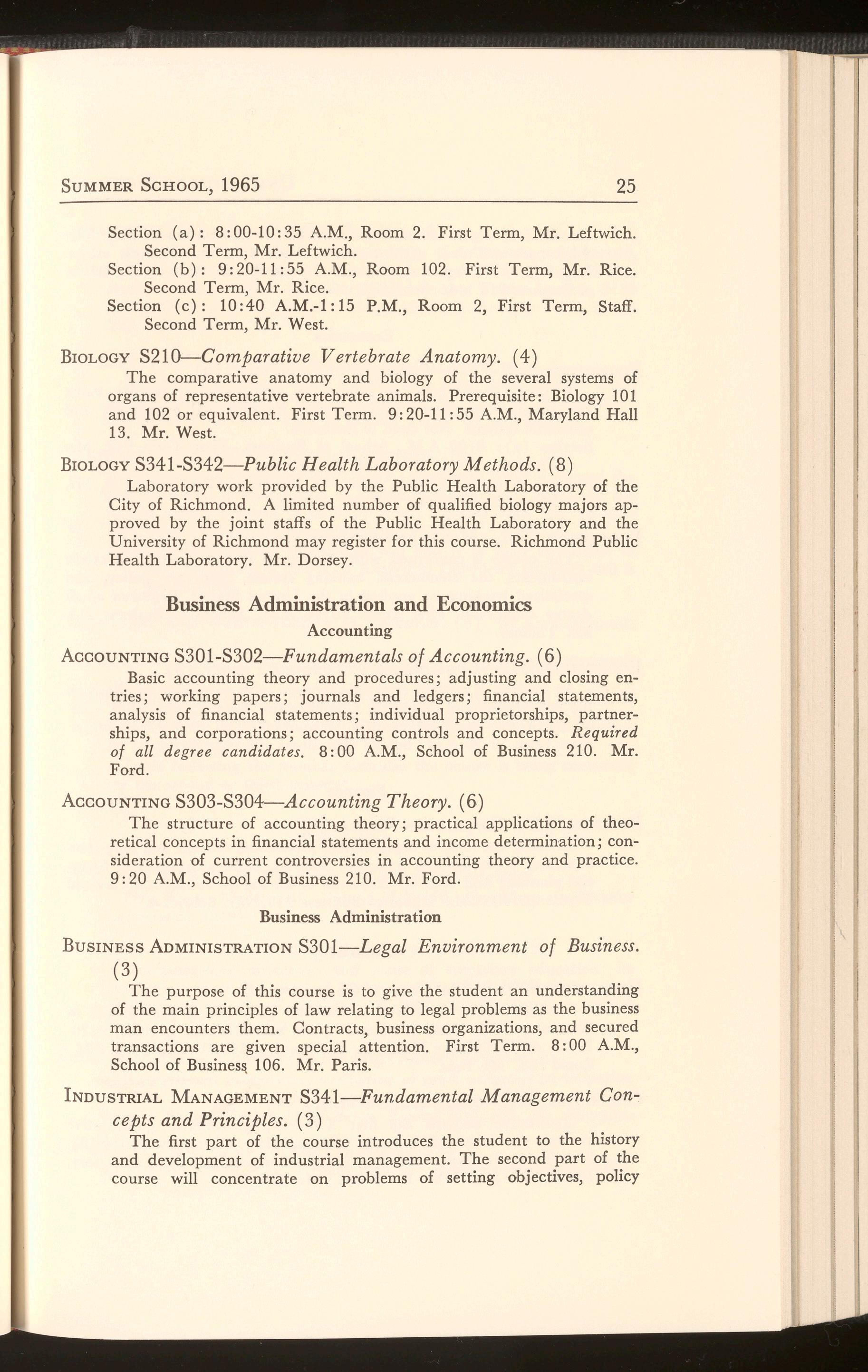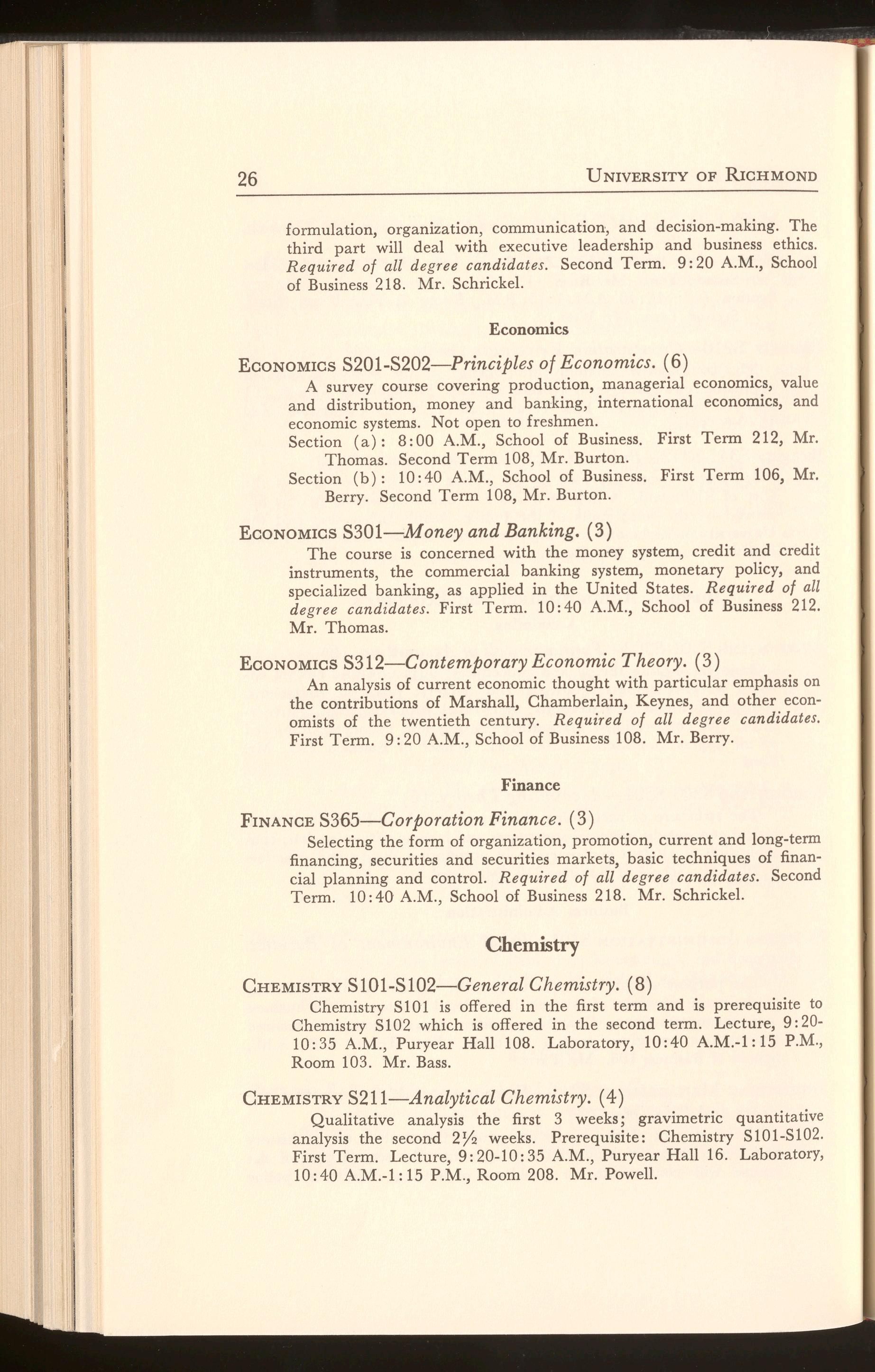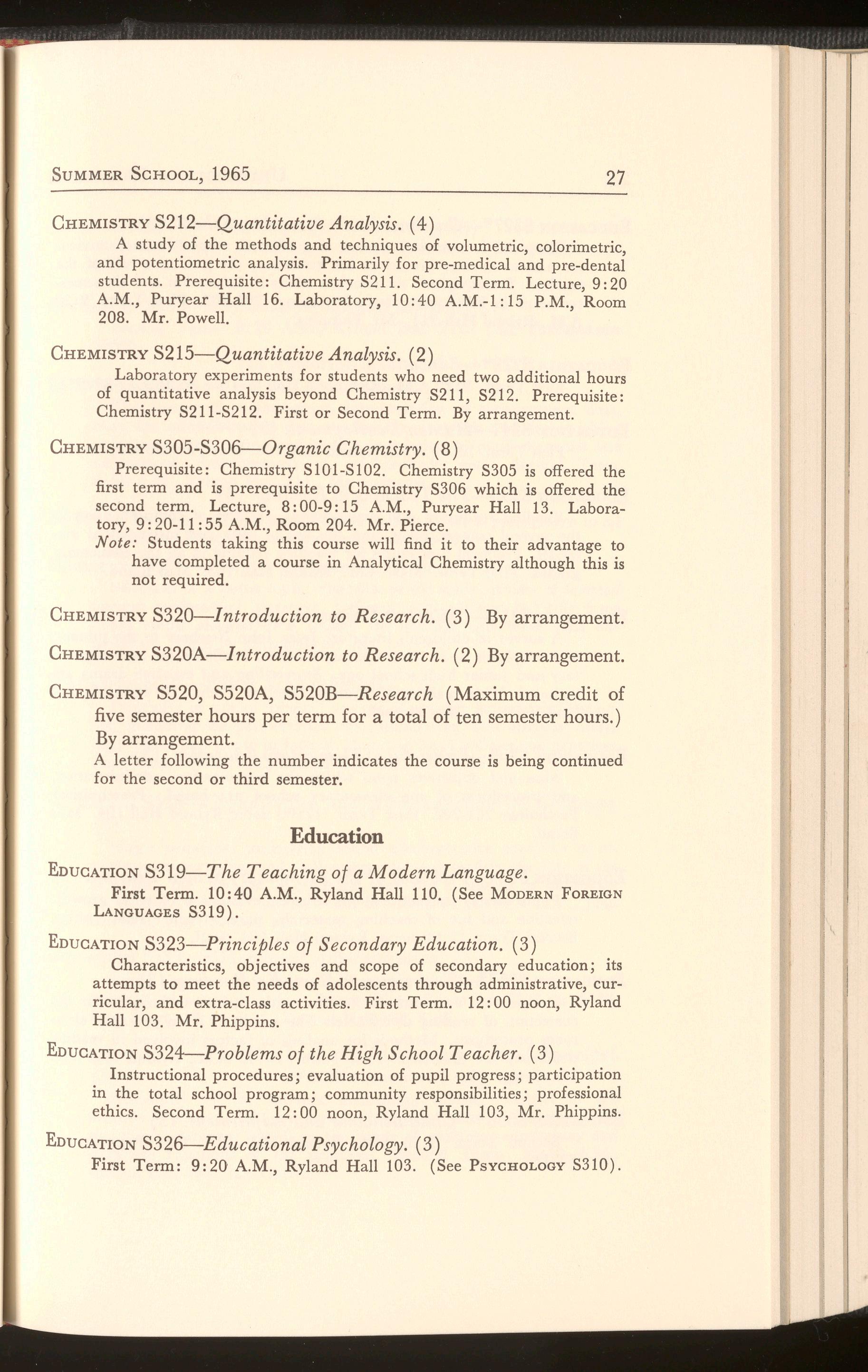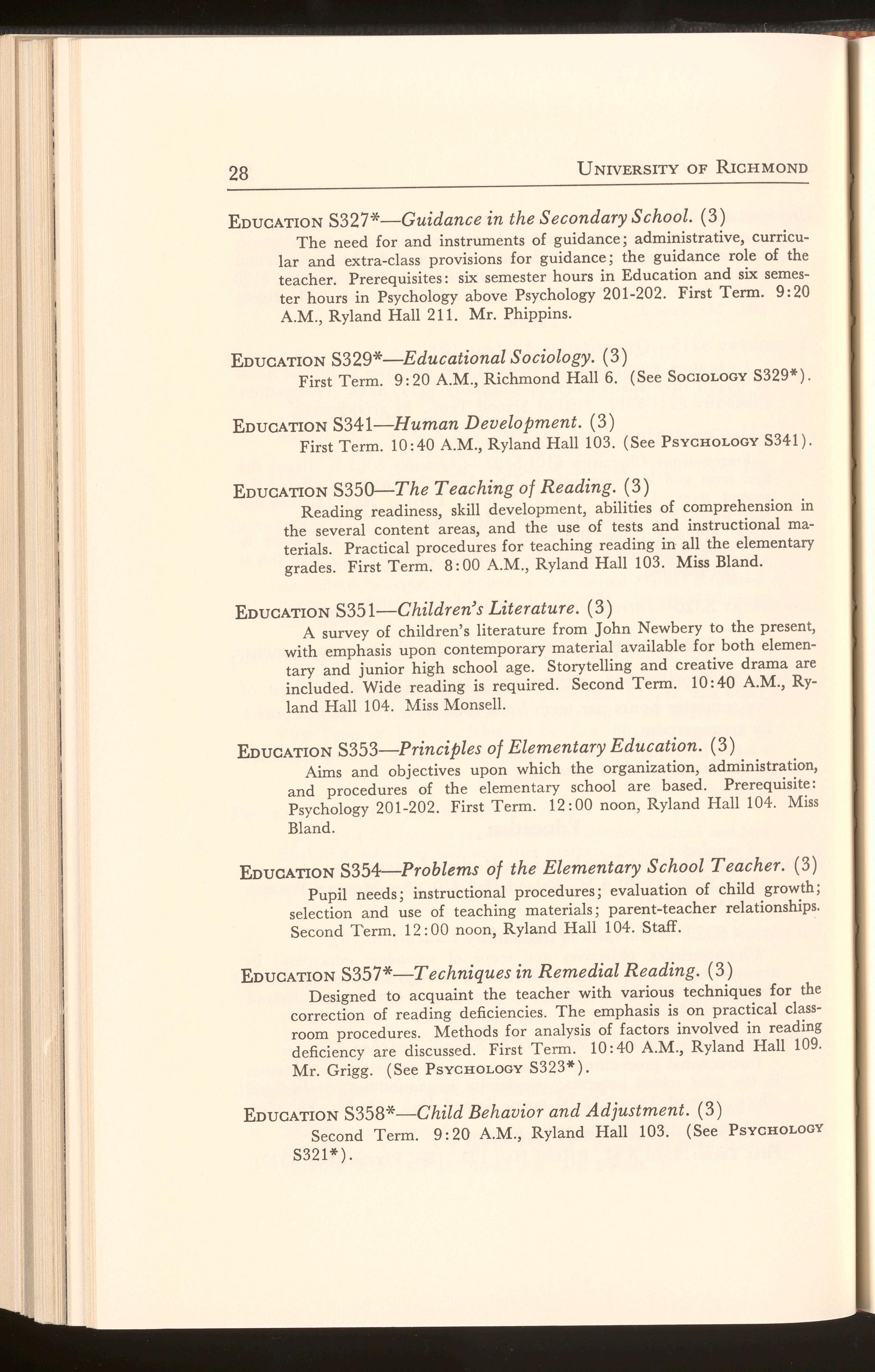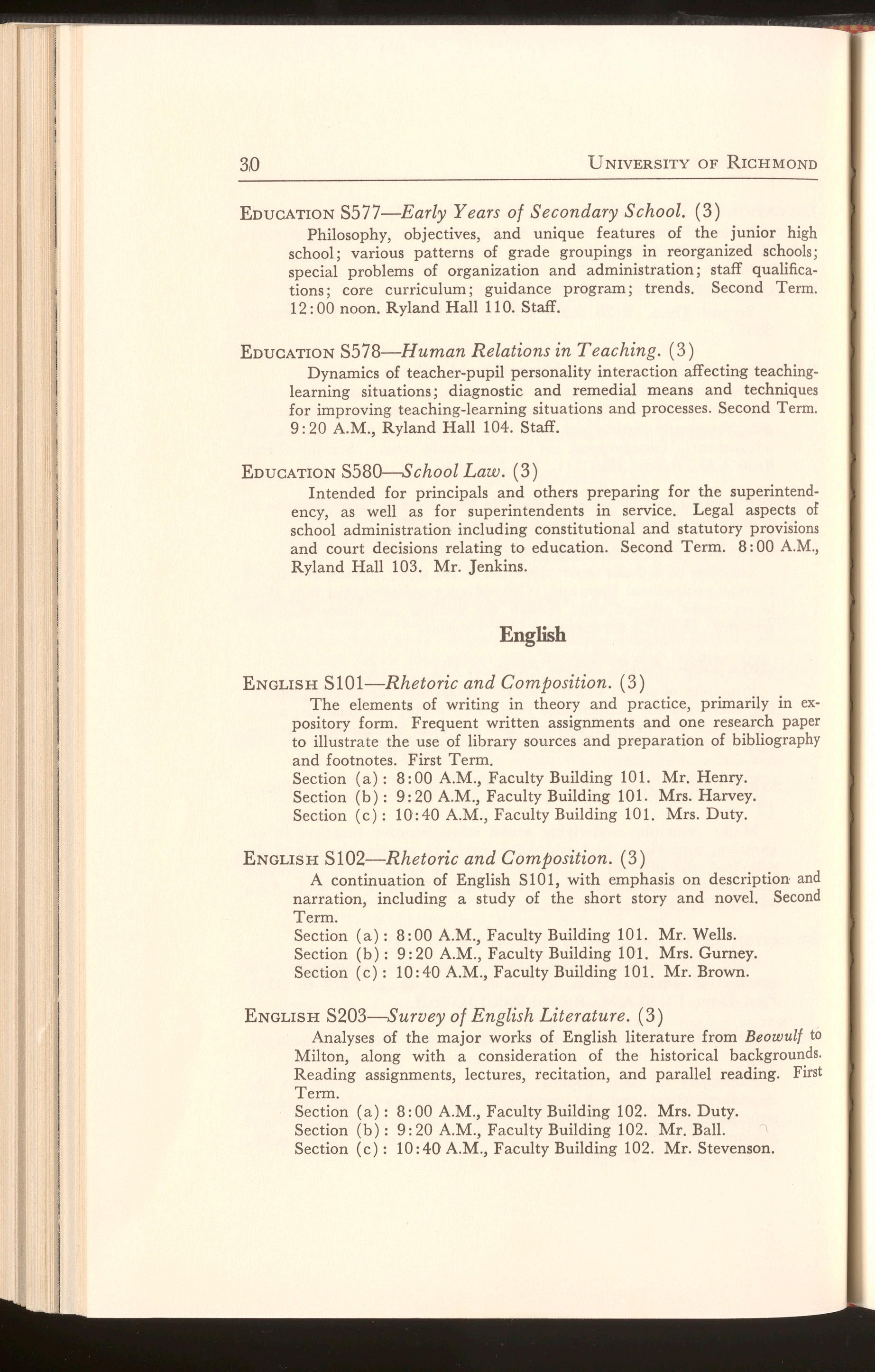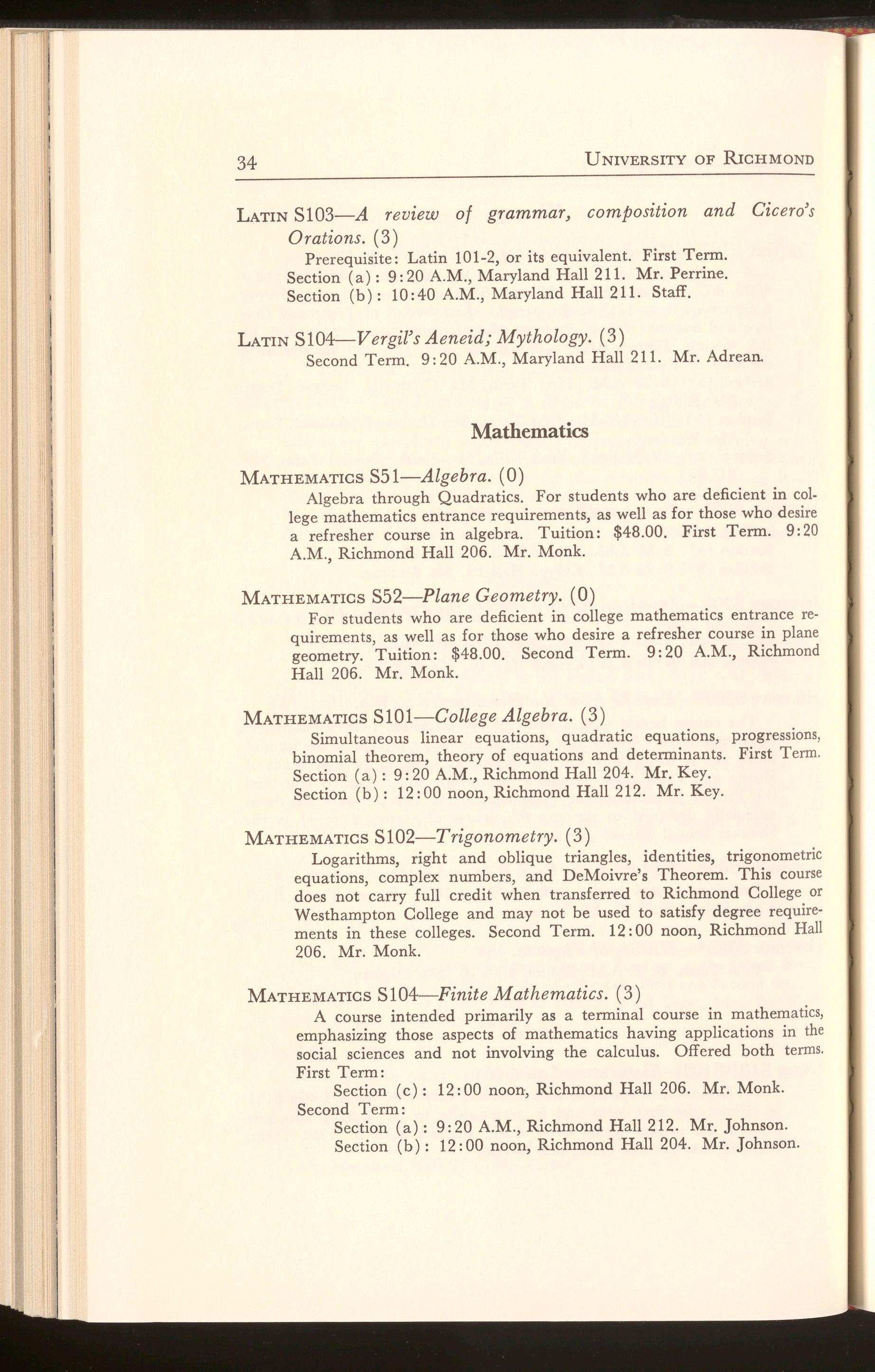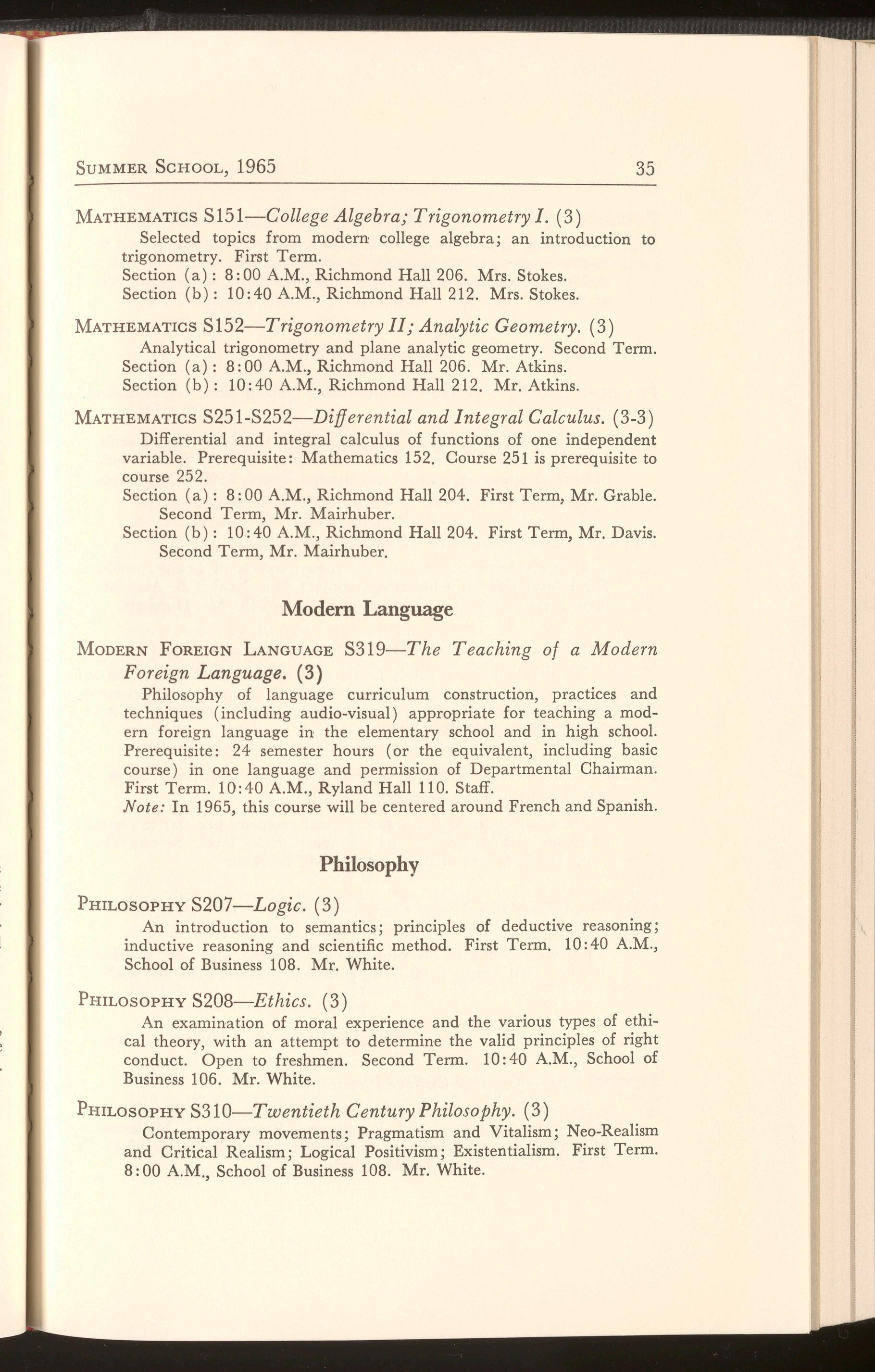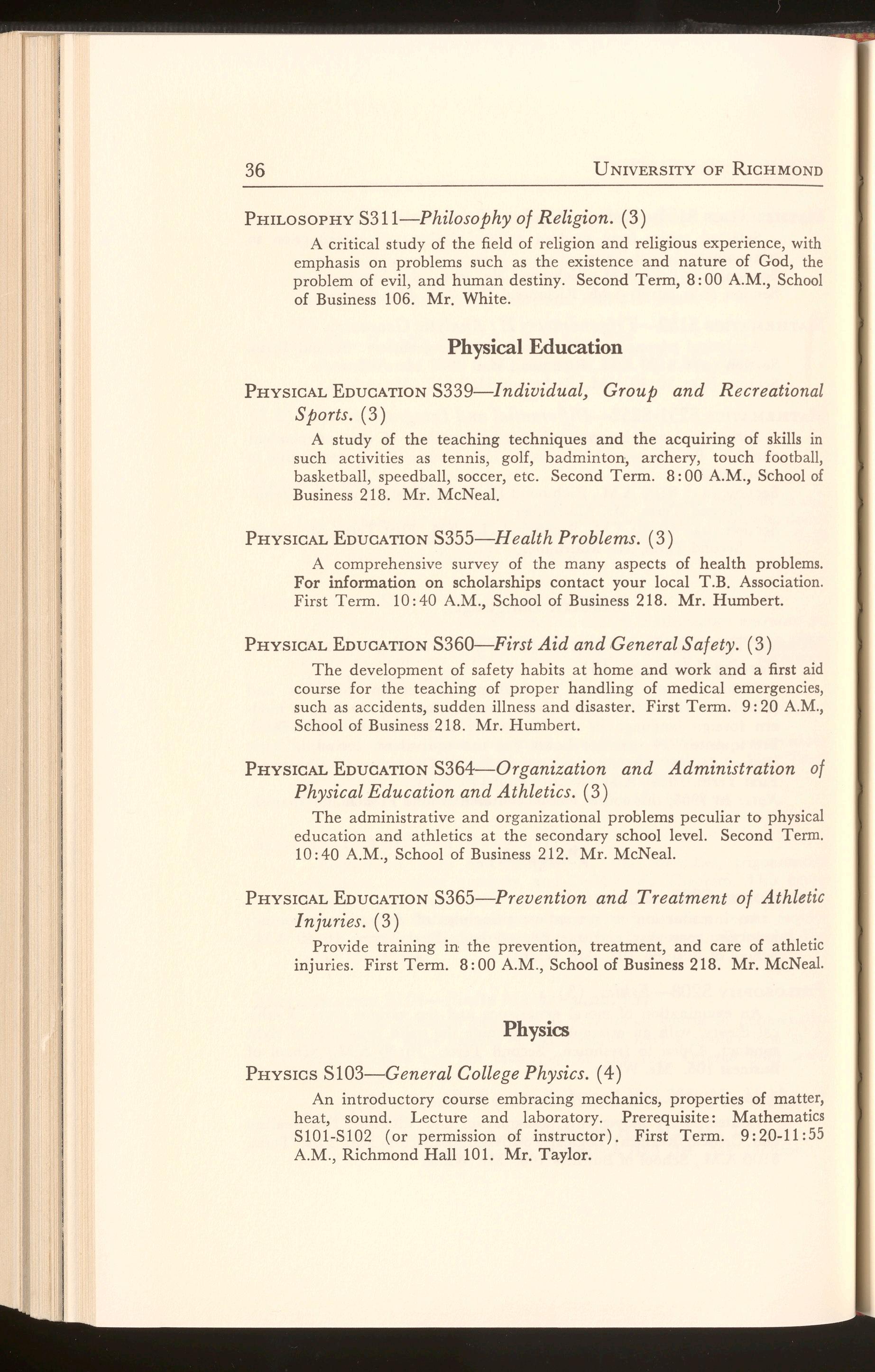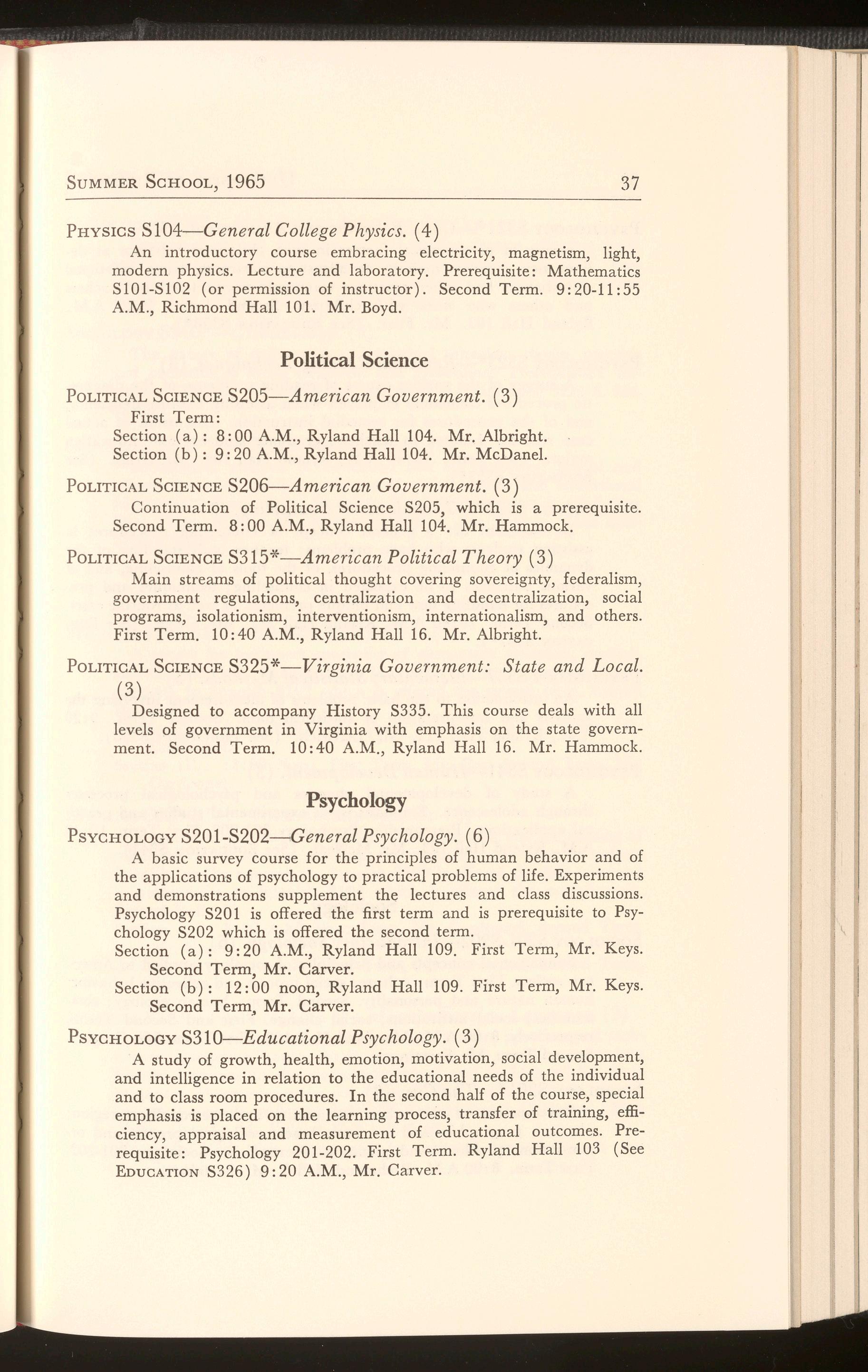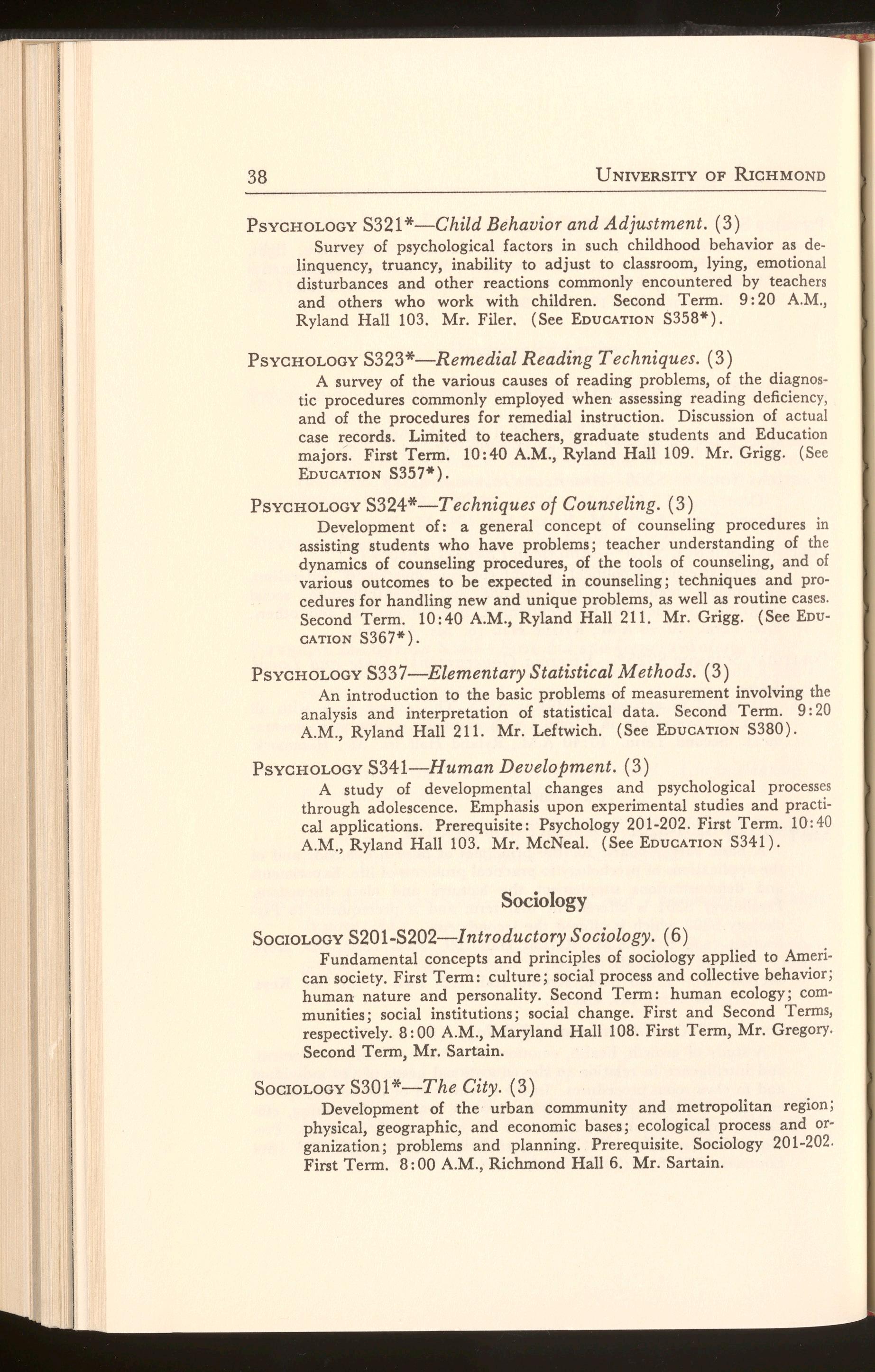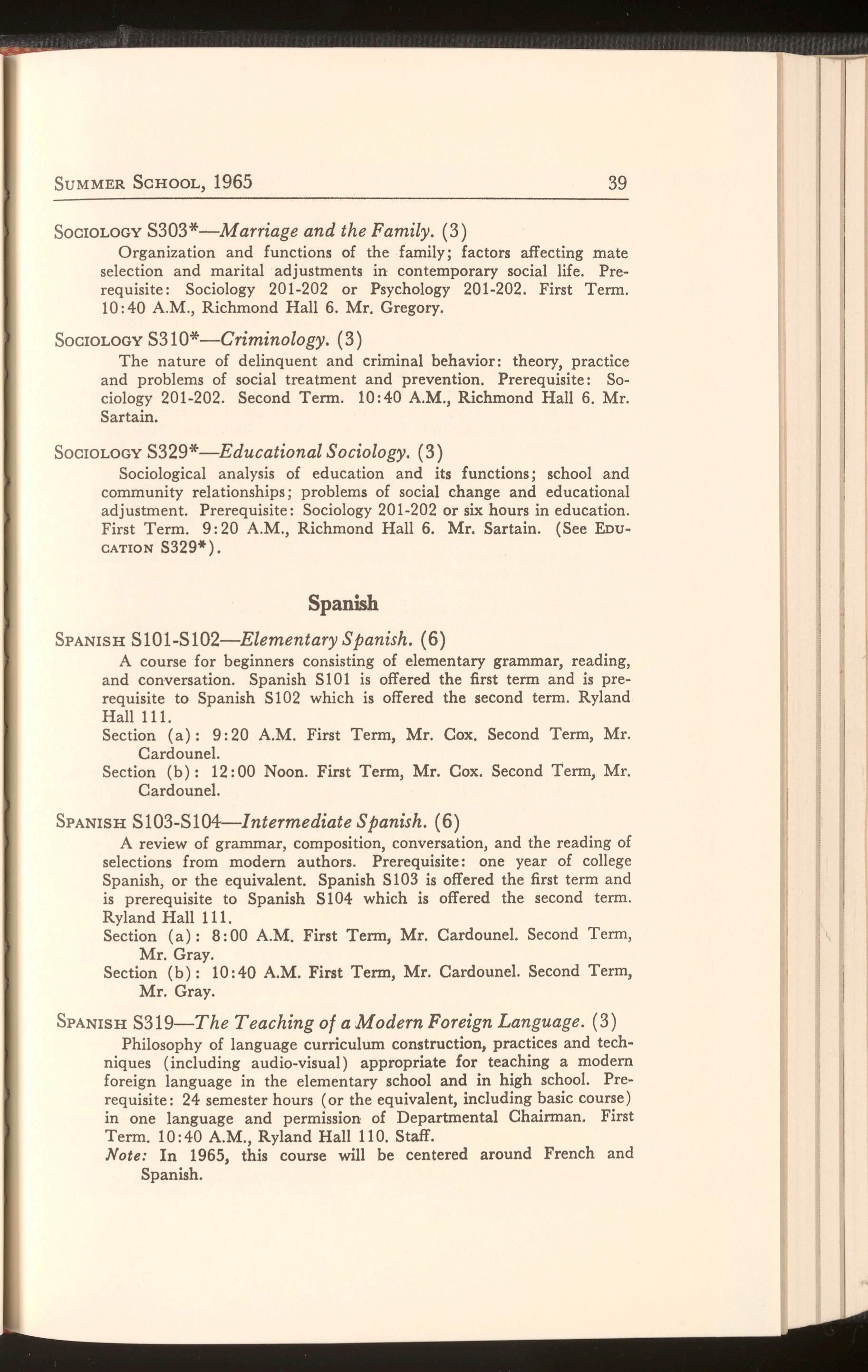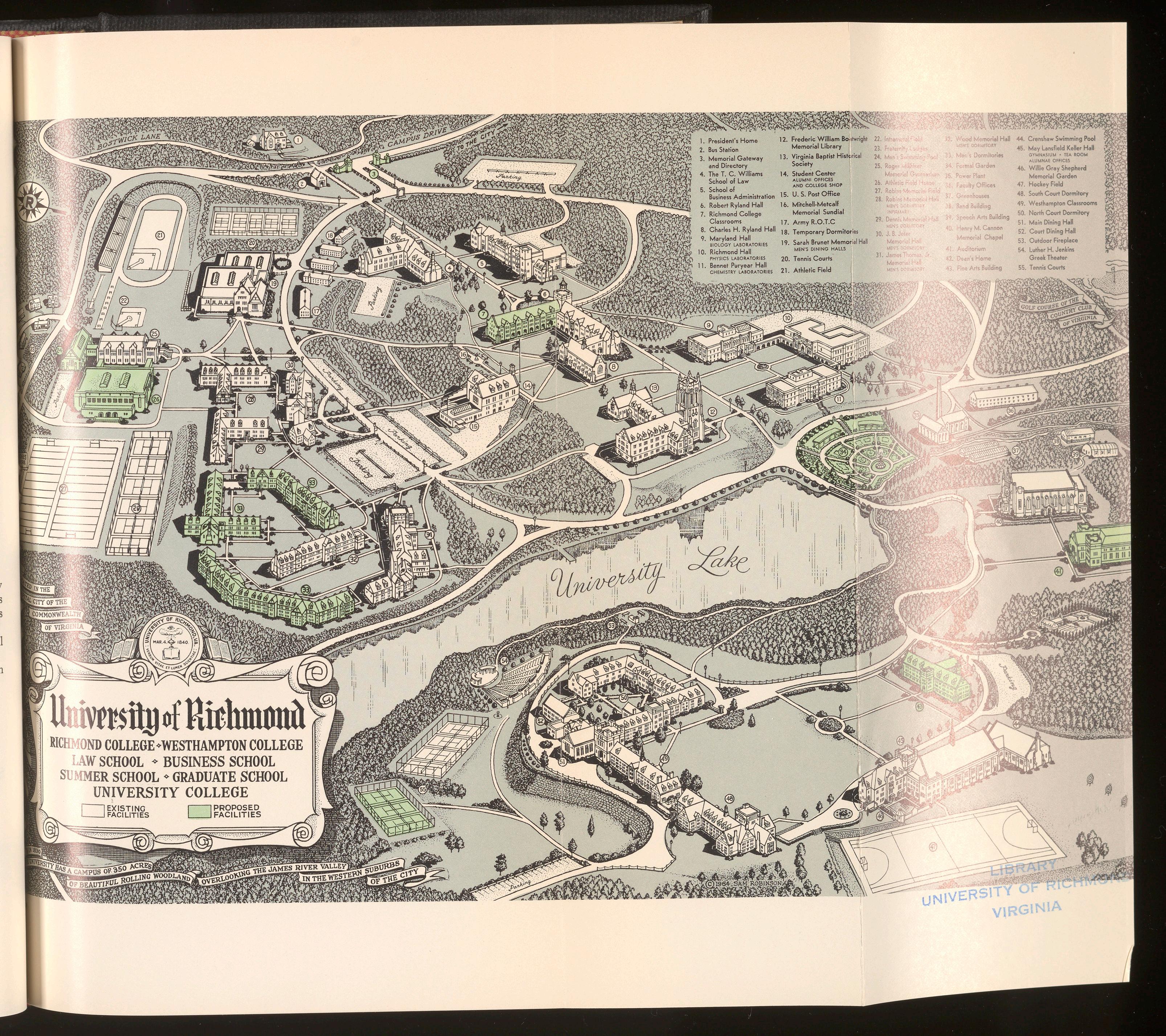GENERAL INFORMATION
Organization
Established in 1920, the Summer School became the fourth division in the University of Richmond. The first of the seven divisions of the University of Richmond was Richmond College, founded in 1830 as a college of liberal arts and sciences for men. The remaining divisions are the T. C. Williams School of Law ( 1870); Westhampton College, a college of liberal arts and sciences for women (1914); the Graduate School (1921); the School of Business Administration ( 1949); and University College ( 1962). Each school has its own dean, its own faculty, and its own institutional life. The University Senate, on which sit representatives of all the faculties, provides for intercollegiate cooperation.
The legal name of the corporation is University of Richmond. It was founded and is supported by the Baptists of Virginia. The Board of Trustees of the University of Richmond controls all endowment and other funds and makes all appropriations. The several colleges award no degrees, but all degrees for work done in any one of the colleges are conferred by the University of Richmond. Ultimate authority is vested in the Board of Trustees and the President of the University.
The University of Richmond, one of the twenty-four affiliated institutions of the University Center in Virginia, benefits from the several co-operative programs of the Center.
Grounds and Buildings
The campus of the University of Richmond, often referred to as one of the most beautiful natural college campuses in the United States, contains three hundred and fifty acres of lawns and woodlands. It is situated on the hills above the historic James River, about six miles west of downtown Richmond and may be reached by buses operating on frequent schedules.
All permanent buildings are of substantial fireproof construction, and everywhere attention has been paid to safety, health, and comfort in surroundings of striking landscape and architectural beauty.
The Summer School is usually conducted in the buildings of Richmond College, the office of the Dean of the Summer School being located on the ground floor of Robert Ryland Hall. The Uni-
versity Administrative offices of the President and Treasurer are located on the ground floor (lake side) of the Boatwright Library. The science departments are in Puryear Hall (chemistry), Richmond Hall (physics and mathematics), and Maryland Hall (biology). The School of Business Administration and the T. C. Williams School of Law occupy their respective buildings on the main campus. University College occupies Columbia Building on the downtown campus, Lombardy Street at Grace.
Library Facilities
The libraries of the University contain over 163,000 volumes. The main collection is housed in the imposing Frederic William Boatwright Memorial Library. The central structure, provided by contributions of the Baptists of Virginia, is equipped with the most modern facilities for study and research. A wing of the building contains the valuable collection of the Virginia Baptist Historical Society. In addition to the main collection there are division and departmental collections housed in other buildings on the campus , such as: law, business , biology and chemistry.
The University collections are classified by the Dewey Decimal System, and the students have direct access to the shelves. Instruction in the use of the Library is given to all freshmen.
The collections in the Richmond Public Library, Virginia State Library, Medical College of Virginia Library, and the Virginia Historical Society Library afford exceptional additional facilities for research.
Scope of Offering
Courses are offered to meet the needs of the following:
1. Qualified high school graduates wishing to begin their college studies before the fall term.
2. Regular college students, as well as those working on an accelerated program.
3. Pre-professional students desiring to meet entrance requirements of medical, law, and other professional and technical schools.
4. Students in the T . C. Williams School of Law.
5. Students in the School of Business Administration .
6. Teachers wishing to obtain credit toward degrees or certificates,
SCHOOL, 1965 9
or to renew certificates. Basic courses in biology, chemistry, and physics, and advanced courses in biology and chemistry afford an opportunity for teachers who wish to broaden their field of teaching in science as well as take advanced work in science. 7. Graduate students desiring work leading to the degrees of Master of Arts, Master of Science, and Master of Science in Education.
Length of Session
The 1965 Summer Session will extend through a period of almost eleven weeks. In the first term of five and one-half weeks, from June 14 through July 20, classes will meet daily Monday through Saturday except July 5. In the second term of five and one-half weeks, beginning July 21, classes will meet daily Monday through Saturday except August 7. The length of the class periods will be seventy-five minutes net time. This program will enable one to earn a semester's credit in each course taken for either term.
The Honor System
One of the outstanding traditions of the University of Richmond is the concept of honor held by the students in its several colleges. The Honor System requires that a person shall in all relations of student life act honorably. The essence of the Honor System is that a student's word as a member of the Summer School can be accepted without question as the truth and that any violation of a student's word is an offense against the entire student body. Breaches of the Honor Code include cheating, violation of a signed pledge, lying, stealing, failure to report one's own or witnessed violations of the Honor Code, failure to appear before the Honor Council when summoned, and, in general, breaking one's word of honor in any circumstances.
When a student matriculates for either term of the Summer School, he is given an explanation of the Honor Code, by which he must agree to abide before he can finally complete his matriculation.
University Center for Psychological Services
The University Center for Psychological Services will be in operation during both semesters of the summer session. The Center will provide testing and counseling services and work in reading improvement for students of the Summer School. No special fees will be charged for such services to full-time Summer School students.
Center services are provided also on a special fee basis to individuals not enrolled in the Summer School.
Post Office and Telegraph Address
The post office address is University of Richmond, Virginia 23173. The telegraph address is Richmond, Virginia.
ADMINISTRATION
Requirements for Admission
For admission to the summer session, the applicant must be at least sixteen years of age, and the graduate of an accredited secondary school, except that students twenty-one years of age and over, who are not graduates of accredited secondary schools, but who meet other qualifications, may enter as Special Students, but not as candidates for degrees.
All applicants who have not previously been enrolled in the University of Richmond must present their entrance credentials. A high school certificate form on which their credits may be submitted will be sent, upon request, to students who wish to enter the Summer School direct from high school. Applicants who previously have not attended college must take the Scholastic Aptitude Test of the College Entrance Examination Board. For information concerning testing dates and testing centers for the test, the candidate should inquire at the high school from which he graduated or write to the Educational Testing Service, Box 592, Princeton, New Jersey.
Those applying for admission from accredited colleges or universities need not send a complete transcript of their college work unless they also wish to apply for admission to some other division of the University of Richmond. For admission to the Summer School only, the applicant must present on a form which will be sent with the application blank a statement from the dean or registrar of the institution in which he is currently enrolled to the effect that he is in good standing and that his proposed summer courses are approved. If a student's status changes after this statement is issued, his admission to the Summer School is governed accordingly. A student who wishes to remove a scholastic deficiency must be certified as eligible to return to his college upon successful completion of his Summer School work.
All applications, together with other necessary papers, such as
SUMMER SCHOOL, 1965 11
transcripts or certification of standing statements, should be received in the Summer School office not later than one week prior to the opening of Summer School. Of course, the earlier an application is cleared, the greater are the applicant's chances of getting the classes he desires.
Matriculation
Students register for either term or for both terms Monday, June 14, from 8: 00 A.M. to 11: 30 A.M., and from 1: 00 P.M. to 3: 00 P.M. Students attending the second term only will register on Wednesday, July 21, from 1 :00 P.M. to 4:00 P.M. if they did not register previously on June 14.
Regular class work will begin at 8: 00 A.M. Tuesday, June 15. Class absences count from the first day.
After registration has been completed, no student is permitted to change from one course to another or from one section of a class to another without the approval of the Dean. No such change will be permitted for the first term after Wednesday, June 16, or for the second term after Friday, July 23. The fee for changing classes or sections is $10.00. No change from credit to audit or from audit to credit can be made after the second day of classes.
No matriculations will be accepted for a first-term class after 3: 00 P.M., Tuesday, June 15 or for a second term class after 3: 30 P.M. Thursday, July 22. Students who fail to complete matriculation for the first term by 3: 30 P.M. June 14, in Millhiser Gymnasium or by 4: 00 P .M. the same day through the Treasurer's office will have to pay a late matriculation fee of $10.00. Late registrants for the second term are also subject to the $10.00 late matriculation fee.
In matriculating students, the right is reserved to require the immediate withdrawal of any student from the Summer School whenever the administration decides that such action is desirable.
Absences
Due to the short terms no absences from classes or laboratory periods are allowed except for emergencies. Such emergencies will be considered individually by the Dean or the Dean of Students.
Grading
The achievement of students in class work and in examinations is indicated as follows: The letter A indicates that the work has been excellent (95-100); B, that it has been very good (88-94);
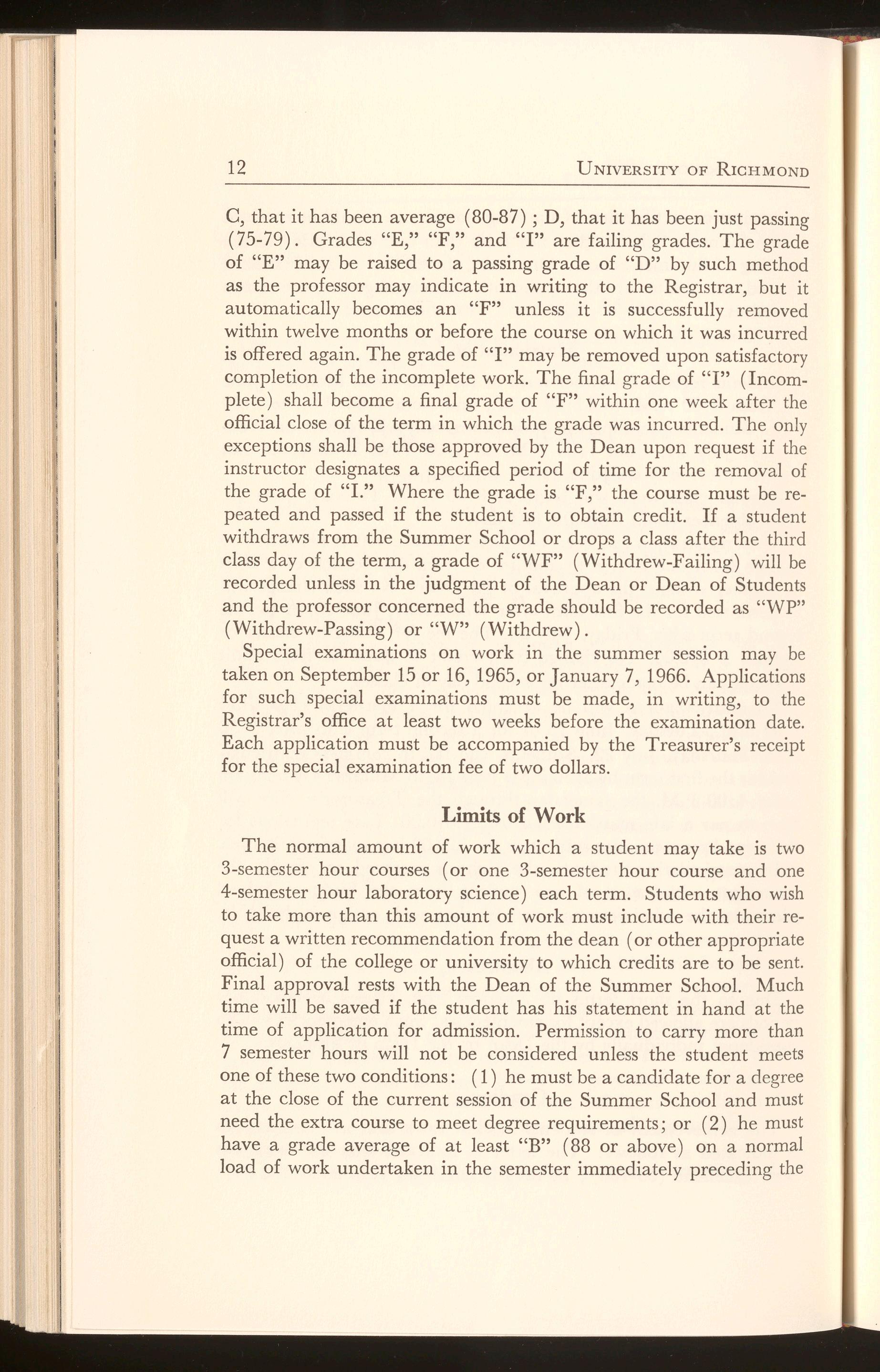
C, that it has been average (80-87) ; D, that it has been just passing (75-79). Grades "E," "F," and "I" are failing grades. The grade of "E" may be raised to a passing grade of "D" by such method as the professor may indicate in writing to the R egistrar, but it automatically becomes an "F" unless it is successfully removed within twelve months or before the course on which it was incurred is offered again. The grade of "I" may be removed upon satisfactory completion of the incomplete work. The final grade of "I" (Incomplete) shall become a final grade of "F" within one week after the official close of the term in which the grade was incurred. The only exceptions shall be those approved by the Dean upon request if th e instructor designates a specified period of time for the removal of the grade of "I." Where the grade is "F," the course must be repeated and passed if the student is to obtain credit. If a student withdraws from the Summer School or drops a class after the third class day of the term, a grade of "WF" (Withdrew-Failing) will be recorded unless in the judgment of the Dean or Dean of Students and the professor concerned the grade should be recorded as "WP" (Withdrew-Passing) or "W" (Withdrew).
Special examinations on work in the summer session may be taken on September 15 or 16, 1965, or January 7, 1966. Applications for such special examinations must be made, in writing, to th e Registrar's office at least two weeks before the examination date. Each application must be accompanied by the Treasurer's receipt for the special examination fee of two dollars.
Limits of Work
The normal amount of work which a student may take is two 3-semester hour courses ( or one 3-semest er hour course and one 4-semester hour laboratory science) each term. Students who wish to take more than this amount of work must include with their request a written recommendation from the dean ( or other appropriate official) of the college or university to which credits are to be sent. Final approval rests with the Dean of the Summer School. Much time will be saved if the student has his statement in hand at the time of application for admission. Permission to carry more than 7 semester hours will not be considered unless the student meets one of these two conditions: ( 1) he must be a candidate for a d egr ee at the close of the current session of the Summer School and must need the extra course to meet degree requirements; or (2) he must have a grade average of at least "B" (88 or above) on a normal load of work undertaken in the semester immediately preceding the

SUMMER SCHOOL, 1965 13
term in which he wishes to carry more than 7 semester hours. In no case will permission be given to carry three courses in one term if one of the courses is a laboratory science.
Veterans attending the Summer School under Public Law 550, 634, or 894 must carry two three-semester-hour courses per term or a five-semester-hour laboratory course in order to be eligible for full subsistence. These courses which the veteran takes must be acceptable for satisfying degree requirements.
Minimum C~ Size
The right is reserved not to organize any class unless there are as many as ten applicants ( 15 in a laboratory science). The right is also reserved to modify or withdraw any class, or to change instructors.
UNDERGRADUATE DEGREES
The following baccalaureate degrees are offered by the University of Richmond through its Summer School: B.A., B.S., B.S. in Business Administration, and B.S. in Teaching.
A candidate for any of these degrees must be a graduate of an accredited secondary school.* His last four years of high-school work must include a minimum of sixteen acceptable units, distributed as follows: English-4; mathematics-3, including 2 in algebra** and 1 in geometry; history-1 ; foreign language-2; science-1. The remaining units are elective from high school graduation requirements except that not more than four units of vocational work will be accepted and no credit will be allowed for less than two units in any foreign language. A student who enters college without two units in foreign language will be required to take in college without degree credit a first-year foreign language to remove his deficiency. He may remove deficiencies in high school algebra by taking Math S51, or in plane geometry by taking Math S52. These are non-credit courses in high school mathematics, offered in the Summer School only.
*An acceptable score on the Virginia State Board of Education High School Completion Examination or the General Educational Development Tests, High School Level, may be considered in lieu of high school graduation. The specific requirements in mathematics and language listed above, however, must still be met.
**One of these units may have been completed in the 8th grade.
The academic requirements for the several degrees are stated in semester hours. Quality credits are calculated from academic hours on the following basis: a semester hour passed with grade A shall count three quality credits; with grade B, two quality credits; with grade C, one quality credit; with grade D, no quality credit.
B.A. and B.S.-During the second semester of his sophomore year, a student must select a field of concentration which will include not less than twenty-four hours in one department and courses in related subjects to bring his total in the field of concentration to a minimum of forty-two semester hours. His program of studies in this field must be made out under the guidance of the chairman of the department in which he wishes to concentrate, and be filed in the Registrar's office. In the majority of cases, the field of concentration will consist of twenty-four hours in one department and eighteen hours in related subjects approved by the chairman of the department. In the laboratory sciences, these will be from thirty to thirty-three and twenty semester hours respectively. For the B.S. degree the whole field of concentration will be chosen from the laboratory sciences and mathematics.
B.S. in Business Administration-Students who wish to enter the School of Business Administration as full-time students must have completed sixty semester hours and must have earned a minimum of a true "C" average on total hours attempted. In selecting applicants for admission, the School of Business Administration is interested in men and women with well-rounded liberal arts backgrounds who have given evidence of earnestness of purpose and have demonstrated leadership qualities.
At least sixty semester hours of approved junior and senior courses, including all those taken during the senior year, must be passed with credit at the University of Richmond; and at least forty-five of these sixty semester hours must be selected from the curriculum offered by the School of Business Administration. For a detailed explanation of this degree, consult the catalogue of the School of Business Administration.
B.S. in Teaching-Courses included in the field of concentration for this degree are selected from the laboratory sciences, mathematics, and education. Specific requirements are listed on page 16 The degree program is administered by the Department of Education, and the student's program of studies must be arranged under the guidance of the chairman of that department in cooperation with the chairmen of the science departments in which the student will be qualified to teach.
DEGREE REQUIREMENTS
A candidate for a degree must offer at least 124 semester hours of work, including not less than 120 hours of academic work. He must earn at least as many quality credits as the total number of semester hours of academic work taken during his college career.
Bachelor of Arts
I. REQUIRED COURSES
ENGLISH 101-102, 203-204
MATHEMATICS One of the following combinations: 101-104; 151-104; 151-152; or 251-252
(A student, however, by passing a special examination-on high-school plane geometry and algebra through quadratics, or by validating his high-school courses in these subjects by completing Mathematics 51-52 without college credit, may thereby satisfy the mathematics requirements for the B.A. degree. Mathematics 151-152, however, is a prerequisite for all advanced science courses.)
FOREIGNLANGUAGES:The second year in each of two foreign languages
NATURALSCIENCES (Biology, Chemistry, Physics): The first year in two of the above sciences (A student who offers one of the Mathematics combinations above may satisfy the natural sciences requirement by offering eight semester hours in only one natural science.)
BIBLE 203 and 207 or 307
HISTORY 107-108
OTHER SocIAL SCIENCES. Six hours in each of two of the following: (Economics 201-202, Education, Philosophy, Politi-
cal Science 205-206, Psychology 201-202, Sociology 201-202)
Bachelor of Science
I. REQUIRED COURSES
ENGLISH 101-102, 203-204
MATHEMATICS251-252
FOREIGNLANGUAGES:The second year in each of two foreignlanguages or two years in one foreign language above course 101-102
NATURALSCIENCES (Biology, Chemistry, Physics): The first year in two of the above sciences
OTHER SOCIAL SCIENCES. Six hours in one of these social sciences: (Economics 201-202 , Educ a tion, Philosophy, Political Science 205-206, Psychology 201-202,
Bachelor of Science in Teaching
I. REQUIRED
ENGLISH 101-102, 203-204
MATHEMATICS.One of the following combinations: 101-104; 151-104; 151-152; or 251-252
FoREIGN LANGUAGES:The second year in each of two languages or two years in one language above course 101-102 if the student has an average of C or better
NATURALSCIENCE: (Biology, Chemistry, Physics): The first year in any one of the above sciences. (See also part II (a) below BIBLE 203 and 207 or 307 .... SocIAL SCIENCES:
History 205 (History 206 is also strongly recommended) .. Psychology 201-202
II. TEACHING FIELD (Science and Mathematics)*
(a) In addition to the first year laboratory science course required above, the two remaining courses among Biology 101-102, Chemistry 101-102, and Physics 103-104, or 217218 16or18
(b) Advanced courses in biology, chemistry, physics or mathematics .
III.
PROFESSIONAL COURSES*
OR
IV.
*A grade of C or better must be earned in all courses in the laboratory sciences mathe
matics, and education presented for the degree. '
E X P ENSES
Fees
Matriculation fee (for one or both terms) ..................... $ 10.00
Tuition ( each semester hour) undergraduate or graduate credit .... . .............. 16 00
Science laboratory fee (each t erm) ........................ .............. 15.00
Dormitory Room Deposit............................................................... 20.00
Room and Board, each term ........
Board for non -resident students, each term .................... .
Bachelor's dip loma fee (must be paid by Aug. 1) ...
Master's diploma and hood fee (must be paid by Aug. 1) ..........................
Late registration or change of class fee ..................... 10 00
Auditing ( attending without credit) per course 48.00
All charges are due at the time of registration Checks should be made payable to University of Richmond.
Notes
A student is not fully matriculated for either term until satisfactory arrangements have been made with the Treasurer for the fees for that term and his full course of study and schedule of classes h a ve been finally approved by the Dean's Office . Students who fail to compl e t e matriculation for the first term by 4:00 P.M. , Monday, June 14, 1965, or Wednesday , July 21, 1965, for the second term, will be charged an extra fee of $10 00. For changing a class or section after matriculation is completed ( ex cept for administrative changes), a fee of $10.00 is charged.
Students are matriculated for a full term. In case of withdrawal for whatever cause, no refund of fe es or any part of f ees is made In th e event of withdrawal on account of student's sickness, proportionate deductions may be made in the charge for board.
A veteran attending under Public Law 894 should have his Certificate of Eligibility and Entitlement when he registers. If he does not have a valid certificate, he will be required to make a deposit which will be equivalent to his fees and the cost of books and supplies.
A veteran attending under Public Law 550 or Public Law 634 must present a Certificate of Education and Training. These veterans
will be required to pay their fees in the same manner as non-veteran students.
Students must register at matriculation all motor vehicles used on the campus and must abide by regulations concerning the use and parking of such vehicles. Failure to register a motor vehicle or abid e by the regulations will subject the student to penalties. These regulations are given to the student at the time of matriculation.
Graduate Scholarships
In the Summer School of 1965, the University offers ten William s Graduate Scholarships of $100 00 each to qualified graduate student s who have been accepted as candidates for the Master's degr ee. Application for these scholarships should be made to Dr. B. C. Holtzclaw, Chairman, Scholarship Committee, University of Richmond, Virginia, not later than April 30, 1965.
Room and Board
The University has ample provision for room and board for both men and women students. Although it does not provide apartmen ts for married couples, the Dean's office maintains a list of apartment s and rooms available off campus to Summer School students .
The College dormitories open for students Sunday afternoon , June 13, for the first term and Tuesday afternoon, July 20, for those who attend second term only . Students are advised not to arrive earlier than this date.
It is important that students who wish to live in the dormitori es make early application for rooms. Rooms in dormitories will be assigned in the order in which the complete application with deposi t is received in the Dean's office. A deposit of twenty dollars must be made by each applicant in order to reserve a particular room. Th is fee will be refunded only if written notice releasing the room is received by the Dean before May 22, 1965. Checks should be ma de payable to Univ ersity of Richmond and enclosed in the letter of application to the Dean. If a student occupies the room, the abov e deposit of twenty dollars is returnable after the close of the session, less any charges for damage to the building or its furniture not previously paid. A student will be billed promptly for any damages to the building or its furniture .
The dormitories and boarding department are conducted as a unit and assignments made by the term. Ordinarily no adjustment is
SCHOOL, 1965 19
made on account of withdrawal. In case of sickness, however, a refund may be made for board. Notice of withdrawal must be given in advance and approved by the Dean or Dean of Students and the Treasurer before any adjustment is made.
The college supplies students' rooms with bedstead, mattress, pillow, dresser, study desk, chairs, and clothes closet. Each student provides his own bed furnishings and linens.
The number and type of electric lamps and appliances in a room are to be limited, and in no instance may the total power rating exceed 650 watts in any room. Television sets are not permitted in dormitory rooms.
It is understood that a single occupant of any room intended for two students shall be responsible for the full rent of the room. No student is allowed to sublet his room, take another student in with him, or move from one room to another without permission from the Dean or Dean of Students. A charge of five dollars is made for changing from one room to another after June 14, except that students are permitted, without paying this charge, to change rooms at the end of the first term, provided request for such change is filed with the Dean's office on or before July 10 of the current session. The charge will be enforced after the opening of the second term.
GRADUATE DEGREES
It is possible for a student who has a standard B.A. or B.S. degree to take the degree of Master of Science in Education by work in the Summer School, provided his work as an undergraduate has been of such quality as to put him in the upper half of his class. Some graduate work may be done in the summer session toward the degrees of Master of Arts and Master of Science but not enough work in these fields is offered at present to allow a person to complete the requirements for the degree in the Summer School only.
Certain courses in a limited number of subjects will be offered on a graduate level in the Summer School. For this summer, these courses will be in the fields of Biology, Chemistry, Education, English, History, Political Science, and Psychology. It is possible, however, that special work may be arranged for graduate students with professors in other subjects as well.
Candidates for the Master's Degree must complete a minimum of 27 semester hours of approved work and submit a satisfactory thesis in their major subject. The whole program of study, including
UNIVERSITY OF RICHMOND
the thesis, must be completed in not less than three and not mor e than five summers. Candidates for the degree must make a grade of at least B in all their work Deficiencies in their work as und ergraduat es may be made up, but this will, of course, require a lon ger time and a greater number of courses.
The requirements for the degree of Master of Science in Education are similar to the requirements for the Master of Arts except that the student does his major work in the field of Education
Those interested in taking the Master's Degree by work in
Summer School should write for particulars to Professor B. C. Holtzclaw , Dean of the Graduate School, University of Richmond, Virginia, 23173.
DEGREES CONFERRED
August 27, 1964
Degrees
Bachelor
SCHEDULE OF CLASSES
Course-First Term
Accounting S301
Bible S203
Biology SlOl (a)
Room Course-Second Term
8:00-9:15
SBA 210
Accounting S302
SBA 200 Bible S207
MH 2 Biology Sl02 (a)
Business Administration S301 SBA 106
Chemistry S305C
Economics S201 (a)
PH 13 Chemistry S306C
SBA 212
SBA 108 Economics S202 (a)
Education S350 RyH 103
RyH 211 Education S381
Education S503 RyH 109
Education S526
English SlOl (a)
English S203 (a)
English S363*
French SlOl (a)
German S103
Greek S203
History S205(a)
History S335*
Latin SlOl
Mathematics Sl51 (a)
Mathematics S251 (a)
Philosophy S310
JMHS
RyH 103
Education S580
FB 101 English S102(a)
FB 102 English S204(a)
FB 103 English S343*
FB 104 French S102(a)
RyH 110 German S104
MH 211 Greek S204
RyH 15
RyH 16
History S206 (a)
RyH 15 History S305*
RyH 16
PH 5 Latin S102
RH 206 Mathematics Sl52(a)
RH 204 Mathematics S252(a)
SBA 108
SBA 106 Philosophy S311
Physical Education S365 SBA 218 Physical Education S339
Political Science S205 (a) RyH 104 Political Science S206 (a)
Sociology S201
Sociology S301 *
MH 108 Sociology S202
RH 6
Spanish S103(a) RyH 111 Spanish S104(a)
9:20-10:35
Accounting S303
Biology SlOl (a)
Biology SlOl (b)
Biology S210
Chemistry SlOlC
Chemistry S211 C
Chemistry S305L
Economics S312
Education S326
Education S327*
SBA 210
Accounting S304
MH 2 Biology Sl02 (a)
MH 102 Biology S102(b) '
MH 13
SBA 218 Business Administration S341
PH 108
Chemistry S102C
PH 16 Chemistry S212C
PH 204 Chemistry S306L
SBA 108
RyH 103
RyH 211
Course-First Term
Education S329*
English SlOl (b)
English S203 (b)
English S315*
FrenchSlOl(b)
German SlOl
History Sl07 (a)
History S205 (b)
Latin S103(a)
Mathematics S51
Mathematics SlOl (a)
Physical Education S360
Physics S103
Political Science S205 (b)
Psychology S201 (a)
Psychology S310
Sociology S329*
Spanish SlOl (a)
Speech SlOl
Bible S310*
Biology SlOl (b)
Biology SlOl ( c)
Biology S210
Chemistry SlOlL
Chemistry S211L
Chemistry S305L
Economics S201 (b)
Economics S301
Education S319
Education S341
Education S357*
Education S533
English SlOl ( c)
English S203(c)
English S327*
French S103(a)
Room
RH 6
RyH 103
RyH 211
RyH 104
FB 101
FB 102
FB 103
FB 104
RyH 110
RyH 15
RyH 16
UNIVERSITY OF RICHMOND
Course-Second Term
Education S358*
Education S380
Education S578
English S102(b)
English S204 (b)
English S316*
French S102(b)
German S102
History S 108 (a)
History S206(b)
MH 211 Latin Sl04
RH 206 Mathematics S52
RH 204
RH 212 Mathematics S104(a)
SBA 218
RH 101 Physics S104
RyH 104
RyH 109
RyH 103
RyH 211
RH 6
RyH 111
RH 214
10:40-11:55
SBA 200
MH 102
MH 2
MH 13
PH 103
PH 208
PH 204
SBA 106
SBA 108
SBA 212
RyH 110
RyH 103
RyH 104
RyH 109
Psychology S202 (a)
Psychology S321 *
Psychology S337
Spanish S102(a)
Speech S102
Bible S307*
Biology S102(b)
Biology S102(c)
Chemistry S102L
Chemistry S212L
Chemistry S306L
Economics S202 (b)
Education S351
RyH 211 Education S367*
RyH 104
RyH 103
FB 101
FB 102
FB 103
SBA 218
FB 104
Education S559
English S102(c)
English S204(c)
English S371*
Finance S365
French S104(a)
Course-First Term Room
French S319
Greek Sl0l
History Sl07(b)
Latin S103 (b)
Mathematics S15l(b)
Mathematics S251 (b)
Philosophy S207
Physical Education S355
Physics S103
Political Science S315*
Psychology S323*
Psychology S341
Sociology S303*
Spanish S103(b)
Spanish S319
Speech S201
Biology Sl0l (c)
Chemistry Sl0lL
Chemistry S211L
Education S323
Education S353
French S103 (b)
History S 107 ( c)
Mathematics SlOl (b)
Mathematics S104(c)
Psychology S201 (b)
SpanishSl0l(b)
Term
RyH 110
PH 5
RyH 15
MH 211
RH 212
RH 204
SBA 108
SBA 106
SBA 218
SBA 212
RH 101
RyH 16
RyH 109
RyH 211
RyH 103
RH 6
RyH 111
RyH 110
RH 214
RH 214
12:00-1 :15
MH 2
PH 103
PH 208
RyH 103
RyH 104
RyH 110
FB 104
RyH 15
RH 212
RH 206
RH 204
RyH 109
RyH 111
Greek Sl02
History S 108 ( b)
Mathematics S 152 (b)
Mathematics S252 (b)
Philosophy S208
Physical Education S364
Physics Sl04
Political Science S325*
Psychology S324*
Sociology S31 0*
Spanish Sl04(b)
Speech SlOl
Speech S105
Biology S102(c)
Chemistry Sl02L
Chemistry S212L
Education S324
Education S354
Education S577
French S104(b)
History Sl08 ( c)
Mathematics S102
Mathematics S104
Psychology S202 (b)
Spanish S102(b)
In the laboratory sciences, C or L after the number indicates class and laboratory respectively. The small letters, (a), (b), etc., indicate sections of the same class.
AS indicates Air Science Building; FB, Faculty Building; MH, Maryland Hall; PH, Puryear Hall; RH, Richmond Hall; RyH, Ryland Hall; SBA, School of Business Administration. Meeting places of the respective classes are the same for both first and second terms, unless otherwise indicated.
COURSES OF INSTRUCTION
Courses numbered 100-199, inclusive, are intended primarily for freshmen; those numbered 200-299, inclusive, for sophomores; those numbered 300-399, inclusive, for juniors and seniors and, in some cases, for graduate students; those numbered 400-499 require work of a research nature for graduate credit; those numbered 500-599 are for graduate students only. Courses numbered 300-399 whose number is followed by an asterisk (*) may be taken by graduate students for graduate credit as one cif the "400" courses mentioned above.
The figure in parentheses following the title of a course indicates the number of semester hours credit allowed for that course. Where two numbers, separated by a hyphen, follow the title of a full year course, either half of the course may be taken without the other half except where a prerequisite is stated.
Bible
BIBLE S203-An Introduction to the Bible. (3)
A study of its general content, unique character, great ideas, historical continuity, relevance, and natur e of its books. A study of th e origin and translation of the Bible is included. First Term. 8: 00 A.M., School of Business 200. Mr. Brizendine.
BIBLE S207-The Life and Teachings of Jesus. (3)
A study of the life and teachings of Jesus, as presented in the Gospels Second Term. 8: 00 A.M., School of Business 200. Mr . Hart.
BIBLE S307*-The Religion of the Hebrew Prophets. (3)
The Hebrew Prophets and the r elevance of their messages to our world today. Second Term. 10: 40 A.M , School of Business 200. Mr. Alley.
BIBLE S310*-The Letters of Paul. (3)
A study of the letters of Paul, their background, and their meaning for today. First Term. 10: 40 A.M., School of Business 200. Mr . James.
Biology
BIOLOGY S101-S102-Principles of Biology. (8)
The fundamental principles of Biology and their application to man. Biology SlOl is offered in the first term and is prerequisite to Biology S102 which is offered in the second term. All sections meet in Maryland Hall.
Section (a): 8:00-10:35 A.M., Room 2. First Term, Mr. Leftwich Second Term, Mr. Leftwich.
Section (b) : 9: 20-11: 55 A.M., Room 102. First Term, Mr. Rice. Second Term, Mr. Rice.
Section (c): 10:40 A.M.-1: 15 P.M., Room 2, First Term, Staff. Second Term, Mr. West.
BIOLOGY S210--Comparative Vertebrate Anatomy. (4)
The comparative anatomy and biology of the several systems of organs of representative vertebrate animals. Prerequisite: Biology 101 and 102 or equivalent. First Term. 9: 20-11: 55 A .M., Maryland Hall 13. Mr. West.
BIOLOGY S34 l-S342-Public Health Laboratory Methods. ( 8)
Laboratory work provided by the Public Health Laboratory of the City of Richmond. A limited number of qualified biology majors approved by the joint staffs of the Public Health Laboratory and the University of Richmond may register for this course. Richmond Public Health Laboratory. Mr. Dorsey.
Business Administration and Economics Accounting
AccoUNTING S301-S302-Fundamentals of Accounting. (6)
Basic accounting theory and procedures; adjusting and closing entries; working papers ; journals and ledgers; financial statements, analysis of financial statements; individual proprietorships, partnerships, and corporations; accounting controls and concepts. Required of all degree candidates. 8: 00 A.M., School of Business 210. Mr Ford.
AccoUNTING S303-S304-Accounting Theory. (6)
The structure of accounting theory; practical applications of theoretical concepts in financial statements and income determination; consideration of current controversies in accounting theory and practice . 9: 20 A.M., School of Business 210. Mr. Ford.
Business Administration
BUSINESS ADMINISTRATION S301-Legal Environment of Business. (3)
The purpose of this course is to give the student an understanding of the main principles of law relating to legal problems as the business man encounters them. Contracts, business organizations, and secured transactions are given special attention. First Term. 8 : 00 A.M., School of Busines& 106. Mr. Paris
INDUSTRIAL MANAGEMENT
S341-Fundamental Management Concepts and Principles. (3)
The first part of the course introduces the student to the history and development of industrial management. The second part of the course will concentrate on problems of setting objectives, policy
UNIVERSITY OF RICHMOND
fo rmulation, organi zation , communication, and decision-making. The third part will deal with executive leadership and business ethics . Required of all degree candidates. Second Term. 9: 20 A .M., School of Business 218. Mr. Schrickel.
Economics
ECONOMICS
S201-S202-Principles of Economics. (6)
A survey course covering production, managerial economics, valu e and distribution, money and banking , international economics, and economic systems. Not open to freshmen.
Section (a): 8:00 A.M., School of Business First Term 212, Mr. Thomas. Second Term 108, Mr . Burton.
Section (b): 10:40 A.M., School of Business. First Term 106, Mr. Berry. Second Term 108, Mr Burton.
ECONOMICS S301-Money and Banking. (3)
The course is concerned with the money system, credit and credit instruments , the commercial banking system, monetary policy, and specialized banking, as applied in the United States Required of all degree cand idates. First Term. 10: 40 A.M., School of Business 212. Mr. Thomas.
EcoNOMICS S312-Contemporary Economic Theory. (3)
An analysis of current economic thought with particular emphasis on the contributions of Marshall, Chamberlain, Keynes, and other economists of the twentieth century. Required of all degree candidates First Term 9: 20 A.M ., School of Business 108. Mr. Berry.
Finance
FINANCE S365-Corporation Finance. (3)
Selecting the form of organization, promotion, current and long-term financing, securities and securities markets, basic techniques of financial planning and control. Required of all degree candidates. Second Term. 10: 40 A.M., School of Business 218. Mr Schrickel.
Chemistry
CHEMISTRY S101-S102-General Chemistry. (8)
Chemistry SlOl is offered in the first term and is prerequisite to Chemistry Sl02 which is offered in the second term. Lecture, 9: 2010: 35 A.M., Puryear Hall 108. Laboratory, 10: 40 A.M.-1: 15 P .M ., Room 103. Mr Bass.
CHEMISTRY S211-Analytical Chemistry. (4)
Qualitative analysis the first 3 weeks; gravimetric quantitative analysis the second 2½ weeks. Prerequisite: Chemistry Sl01-Sl02 First Term. Lecture, 9: 20-10: 35 A.M., Puryear Hall 16. Laboratory, 10: 40 A .M .-1: 15 P M , Room 208. Mr. Powell.
SUMMER SCHOOL, 1965 27
CHEMISTRY S212-Quantitative Analysis. (4)
A study of the methods and techniques of volumetric, colorimetric, and potentiometric analysis. Primarily for pre-medical and pre-dental students. Prerequisite: Chemistry S2 l 1. Second Term. Lecture, 9: 20 A.M., Puryear Hall 16. Laboratory, 10:40 A.M.-1: 15 P.M., Room 208. Mr. Powell.
CHEMISTRY S215-Quantitative Analysis. (2)
Laboratory experiments for students who need two additional hours of quantitative analysis beyond Chemistry S211, S212. Prerequisite: Chemistry S211-S212. First or Second Term. By arrangement.
CHEMISTRY S305-S306-Organic Chemistry. (8)
Prerequisite: Chemistry Sl01-S102. Chemistry S305 is offered the first term and is prerequisite to Chemistry S306 which is offered the second term. Lecture, 8:00-9:15 A.M., Puryear Hall 13. Laboratory, 9: 20-11: 55 A.M., Room 204. Mr. Pierce.
Note: Students taking this course will find it to their advantage to have completed a course in Analytical Chemistry although this is not required.
CHEMISTRY S320-Introduction to Research. (3) By arrangement.
CHEMISTRY S320A-Introduction to Research. (2) By arrangement.
CHEMISTRY S520, S520A, S520B-Research (Maximum credit of five semester hours per term for a total of ten semester hours.) By arrangement.
A letter following the number indicates the course is being continued for the second or third semester.
Education
EDUCATION S319-The Teaching of a Modern Language. First Term. 10:40 A.M., Ryland Hall 110. (See MODERNFOREIGN LANGUAGESS319).
EDUCATION S323-Principles of Secondary Education. (3)
Characteristics, objectives and scope of secondary education; its attempts to meet the needs of adolescents through administrative, curricular, and extra-class activities. First Term. 12: 00 noon, Ryland Hall 103. Mr. Phippins.
EDUCATION S324-Problems of the High School Teacher. (3) Instructional procedures; evaluation of pupil progress; participation in the total school program; community responsibilities; professional ethics. Second Term. 12: 00 noon, Ryland Hall 103, Mr. Phippins.
EDUCATION S326-Educational Psychology. (3) First Term: 9: 20 A.M., Ryland Hall 103. (See PsYCHOLOGYS310).
UNIVERSITY OF RICHMOND
EDUCATION S327*-Guidance in the Secondary School. (3)
The need for and instruments of guidance; administrative, curricular and extra-class provisions for guidance; the guidance role of the teacher. Prerequisites: six semester hours in Education and six semester hours in Psychology above Psychology 201-202. First Term. 9 : 20 A.M., Ryland Hall 211. Mr. Phippins.
EDUCATION S329*-Educational Sociology. (3) First Term. 9:20 A.M., Richmond Hall 6. (See SocIOLOGYS329*)
EDUCATION S341-Human Development. (3) First Term. 10:40 A.M., Ryland Hall 103. (See PsYCHOLOGYS341).
EDUCATION S350-The Teaching of Reading. (3)
Reading readiness, skill development, abilities of comprehension in the several content areas, and the use of tests and instructional materials. Practical procedures for teaching reading in all the elementary grades. First Term. 8: 00 A .M. , Ryland Hall 103. Miss Bland.
EDUCATION S351-Children's Literature. (3)
A survey of children's literature from John Newbery to the present, with emphasis upon contemporary material available for both elementary and junior high school age. Storytelling and creative drama are included. Wide reading is required. Second Term. 10:40 A.M., Ryland Hall 104. Miss Monsell.
EDUCATION S353-Principles of Elementary Education. (3)
Aims and objectives upon which the organization, administration, and procedures of the elementary school are based. Prerequisite: Psychology 201-202. First Term. 12: 00 noon , Ryland Hall 104. Miss Bland.
EDUCATION S354-Problems of the Elementary School Teacher. (3)
Pupil needs; instructional procedures; evaluation of child growth; selection and use of teaching materials; parent-teacher relationships Second Term. 12: 00 noon, Ryland Hall 104. Staff.
EDUCATION S357*-Techniques in Remedial Reading. (3)
Designed to acquaint the teacher with various techniques for the correction of reading deficiencies. The emphasis is on practical classroom procedures. Methods for analysis of factors involved in reading deficiency are discussed. First Term. 10: 40 A.M., Ryland Hall 109. Mr. Grigg. (See PsYCHOLOGYS323*).
EDUCATION S358*-Child Behavior and Adjustment. (3)
Second Term. 9: 20 A.M., Ryland Hall 103. (See PSYCHOLOGY S321*).
SUMMER SCHOOL, 1965 29
EDUCATION S367*-Techniques of Counseling. (3)
Second Term. 10: 40 A.M., Ryland Hall 211. ( See PSYCHOLOGY S324*).
EDUCATION S380-Elementary Statistical Met hods. (3) Second Term. 9:20 A.M., Ryland Hall 211. (See PsYCHOLOOY S337).
EDUCATION S381*-Tests and Measurements. (3)
The theory of measurement, interpretation of measurement data, tests for administrative and supervisory purposes and for teaching aids, prognostic testing and testing in relation to pupil diagnosis and adjustment. Improvement of teacher-made tests. Second Term. 8: 00 A.M., Ryland Hall 211. Mr. Leftwich.
NOTE: A minimum of 18 semester hours in Education is prerequisite to all graduate Education courses numbered 500-599.
EDUCATION S501-Seminar in Research Problems. (3)
Selection of a thesis topic; direction of the study; review of selected current professional literature. Offered each semester, but only three hours credit allowed even though the seminar lasts more than one semester. Hours by arrangement. Mr. Overton.
EDUCATION S503-Public School Finance. (3)
Principles of school finance; sources of revenue for schools; budgeting, including the performance type; accounting; cost analysis; auditing; trends and needs in federal, state and local policies and practices. First Term. 8:00 A.M., Ryland Hall 109. Mr. Tyler.
EDUCATION S526-Organization and Administration of Guidance. (3)
Major principles underlying sound administrative practices in organizing, supervising, and evaluating guidance service; the role of the principal, the director of guidance, and the counselor in improving the administration of guidance service. First Term. 8: 00 A.M., John Marshall High School, Mr. Dixon.
EDUCATION S533-Educational Administration. (3)
State, city and county educational organization; supervision as a function of administration. Prerequisite: Education S528 or S559. First Term. 10:40 A.M., Ryland Hall 104. Staff.
EDUCATION S559-The Work of the Elementary School Principal. (3)
Philosophy of the modern elementary school; relation to the secondary school and the community; developing a functional instructional program based on the needs of children; supervisory and guidance functions of the principal. Second Term. 10:40 A.M., Ryland Hall 103. Mr. Galvin.
3,0
UNIVERSITY OF RICHMOND
EDUCATION S577-Early Years of Secondary School. (3)
Philosophy, objectives, and unique features of the junior high school; various patterns of grade groupings in reorganized schools; special problems of organization and administration; staff qualifications; core curriculum; guidance program; trends. Second Term. 12: 00 noon. Ryland Hall 110. Staff.
EDUCATION S578-Human Relations in Teaching. (3)
Dynamics of teacher-pupil personality interaction affecting teachinglearning situations; diagnostic and remedial means and techniques for improving teaching-learning situations and processes. Second Term. 9: 20 A.M., Ryland Hall 104. Staff.
EDUCATION S580-School Law. (3)
Intended for principals and others preparing for the superintendency, as well as for superintendents in service. Legal aspects of school administration including constitutional and statutory provisions and court decisions relating to education. Second Term. 8: 00 A.M., Ryland Hall 103. Mr. Jenkins.
English
ENGLISH S101-Rhetoric and Composition. (3)
The elements of writing in theory and practice, primarily in expository form. Frequent written assignments and one research paper to illustrate the use of library sources and preparation of bibliography and footnotes. First Term.
Section (a): 8:00 A.M., Faculty Building 101. Mr. Henry.
Section (b): 9: 20 A.M., Faculty Building 101. Mrs. Harvey.
Section (c): 10:40 A.M., Faculty Building 101. Mrs. Duty.
ENGLISH S102-Rhetoric and Composition. (3)
A continuation of English SlOl, with emphasis on description and narration, including a study of the short story and novel. Second Term.
Section (a) : 8: 00 A.M., Faculty Building 101. Mr. Wells.
Section (b): 9: 20 A.M., Faculty Building 101. Mrs. Gurney.
Section (c): 10:40 A.M., Faculty Building 101. Mr. Brown.
ENGLISH S203-Survey of English Literature. (3)
Analyses of the major works of English literature from Beowulf to Milton, along with a consideration of the historical backgrounds. Reading assignments, lectures, recitation, and parallel reading. First Term.
Section (a) : 8: 00 A.M., Faculty Building 102. Mrs. Duty.
Section (b) : 9: 20 A.M., Faculty Building 102. Mr. Ball.
Section ( c) : 10: 40 A.M., Faculty Building 102. Mr. Stevenson.
ENGLISH S204-Survey of English Literature. (3)
A continuation of English S203. A study of the major works in English literature from the Restoration through the Nineteenth Century. Second Term.
Section (a): 8: 00 A.M., Faculty Building 102. Mr. Peple.
Section (b): 9: 20 A.M., Faculty Building 102. Mr. Guthrie. Section (c): 10:40 A.M., Faculty Building 102. Mrs. Gurney.
ENGLISH S315*-Shakespeare. (3)
A study of the early plays-comedies, histories, and tragedies. First Term. 9: 20 A.M., Faculty Building 103. Mr. Stevenson.
ENGLISH S316*-Shakespeare. (3)
A study of the tragedies of Shakespeare's maturity-Hamlet, Macbeth, Othello, King Lear. Second Term. 9: 20 A.M. Faculty Building 103. Mr. Peple.
ENGLISH S327*-Development of the English Language. (3)
An introductory study of language sciences, with a special study of the historical development of English, its phonology, inflections, vocabulary, and syntax. First Term. 10:40 A.M. Faculty Building 103. Mr. Henry.
ENGLISH S343*-Contemporary British and American Literature. (3)
British and American literature of the present century, with special attention to British writers of prose and poetry, including T. S. Eliot. Second Term. 8: 00 A.M. Faculty Building 103. Mr. Brown.
ENGLISH S363*-Literature of the South. (3)
A survey of representative poetry and prose of the Southern States, with attention to cultural, social, and political backgrounds. First Term. 8: 00 A.M. Faculty Building 103. Mr. Ball.
ENGLISH S371*-The Short Story. (3)
A historical survey of the short story as a literary form. Intensive study of British, American, and Continental short stories since Poe. Second Term. 10:40 A.M. Faculty Building 103. Mi:. Guthrie.
French
FRENCH S101-S102-Elementary French. (6)
A course for beginners, consisting of elementary grammar, reading, conversation. French S 101 is offered the first term and is prerequisite to French Sl02 which is offered in the second term.
Section (a): 8:00 A.M., Faculty Building 104. First Term, Mr. Stone. Second Term, Mr. Goard.
Section (b): 9: 20 A.M., Faculty Building 104. First Term, Mr. Stone. Second Term, Mr. Lavender.
UNIVERSITY OF RICHMOND
FRENCH S103-S104-lntermediate French. (6)
A review of grammar, composition, conversation, and the reading of selections from modern authors. Prerequisite: one year of college French, or the equivalent. French S103 is offered the first term and is prerequisite to French Sl04 which is offered the second term.
Section (a): 10:40 A.M., Faculty Building 104. First Term, Mrs. Pastuhova. Second Term, Mr. Goard.
Section (b): 12:00 noon, Faculty Building 104. First Term, Mrs. Pastuhova. Second Term, Mr. Lavender.
FRENCH S319-The Teaching of a Modern Foreign Language. (3) Philosophy of language curriculum construction, practices and techniques (including audio-visual) appropriate for teaching of a modern foreign language in the elementary school and in high school. Prerequisite: 24 semester hours ( or the equivalent, including basic course) in one language and permission of Departmental Chairman. First Term. 10:40 A.M., Ryland Hall 110. Staff.
Note: In 1965, this course will be centered around French and Spanish.
German
GERMAN S101-S102-Elementary German. (6)
A study of elementary grammar, pronunciation, reading, and conversation. German SlOl is offered the first term and is prerequisite to German S102 which is offered in the second term. 9:20 A.M., Ryland Hall 110. First Term, Mr. Crow. Second Term, Mr. Skinner.
GERMAN S103-S104-lntermediate German. (6)
A review of grammar, composition, conversation, and the reading of selections from modern authors. Prerequisite: one year of college German, or the equivalent. German Sl03 is offered the first term and is prerequisite to German S104 which is offered the second term. 8:00 A.M., Ryland Hall 110. First Term, Mr. Crow. Second Term, Mr. Skinner.
Greek
GREEK S101-S102-Elementary Greek. (6)
A course in grammar and readings designed to acquaint the beginner with the elements of the language. Reading in the Greek New Testament will be done in the second semester. First and Second terms, respectively. 10: 40 A.M., Puryear Hall 5. First Term, Mrs. Barthlemess. Second Term, Mr. Catlin.
GREEK S203-Plato. ( 3)
Apology and other selected writings of Plato. First Term. 8: 00 A.M., Maryland Hall 211. Mrs. Barthlemess.
GREEK S204-Homer. (3)
Selected portions of the Iliad and Odyssey. Second Term. 8: 00 A.M., Maryland Hall 211. Mr. Catlin.
His
History
TORY S 107-S108---Survey of European Civilization. ( 6)
A rapid survey of the civilization of the Western world from about 4000 B.C. to the present. History S107 ends at 1715 and History S108 covers from 1715 to the present. Required of all Richmond College and Summer School students who are candidates for the B.A. or B.S. degree. History S107 is offered the first term and History Sl08 the second. Ryland Hall 15.
Section (a): 9: 20 A.M. First Term, Mr. Cromwell. Second Term, Mr. Rilling.
Section (b): 10:40 A.M. First Term, Mr. Cromwell. Second Term, Mr. Westin.
Section ( c): 12: 00 noon. First Term, Mr. Smith. Second Term, Mr. Rilling.
HISTORY S205-American History to 1865. (3)
First Term.
Section (a): 8:00 A.M., Ryland Hall 15. Mr. McDanel. Section (b): 9:20 A.M., Ryland Hall 16. Mr. Duncan.
HISTORY S206-American History 1865 to the Present. (3) Serond Term.
Section (a): 8:00 A.M., Ryland Hall 16. Mr. Westin.
Section (b): 9:20 A.M., Ryland Hall 16. Mr. Duncan.
HISTORY S304*-Europe from the Renaissance to Waterloo. (3)
The course begins with a study of the transition from Medieval to Modern Europe. Attention is given to the major aspects of the Renaissance and Reformations, the rise of modern science, the emergence of Russia and Prussia, the struggles for empire, the Enlightenment, and the French Revolution and Napoleonic Era. The itinerary has been especially designed to support the course of study. Offered in the Summer School Abroad program.
HisTORY S305*-History of the Civil War and Reconstruction. (3) American history in the period 1860 to 1877. Second Term. 8:00 A.M., Ryland Hall 15. Mr. Duncan.
HrsTORY S335*-History of Virginia. (3) First Term. 8: 00 A.M., Ryland Hall 16. Mr. Duncan.
Latin
LATIN S101-S102-Elementary Latin. (6)
For beginners or for those who have had very little Latin. Latin SlOl is offered the first term and is prerequisite to Latin S102 which is offered the second term. 8: 00 A.M., Puryear Hall 5. First Term, Mr. Perrine. Second Term, Mr. Adrean.
UNIVERSITY OF RICHMOND
LATIN S103-A review of grammar, composition and Cicero's Orations. (3)
Prerequisite: Latin 101-2, or its equivalent. First Term. Section (a) : 9: 20 A.M., Maryland Hall 211. Mr. Perrine. Section (b): 10:40 A.M., Maryland Hall 211. Staff.
LATIN S104-Vergil's Aeneid; Mythology. (3)
Second Term. 9: 20 A.M., Maryland Hall 211. Mr. Adrean.
Mathematics
MATHEMATICS S51-Algebra. (0)
Algebra through Quadratics. For students who are deficient in college mathematics entrance requirements, as well as for those who desire a refresher course in algebra. Tuition: $48.00. First Term. 9: 20 A.M., Richmond Hall 206. Mr. Monk.
MATHEMATICS S52-Plane Geometry. (0)
For students who are deficient in college mathematics entrance requirements, as well as for those who desire a refresher course in plane geometry. Tuition: $48.00. Second Term. 9: 20 A.M., Richmond Hall 206. Mr. Monk.
MATHEMATICS S101-College Algebra. (3)
Simultaneous linear equations, quadratic equations, progressions , binomial theorem, theory of equations and determinants. First Term. Section (a) : 9: 20 A.M., Richmond Hall 204. Mr. Key. Section (b): 12:00 noon, Richmond Hall 212. Mr. Key.
MATHEMATICS S102-Trigonometry. (3)
Logarithms, right and oblique triangles, identities, trigonometric equations, complex numbers, and DeMoivre's Theorem. This course does not carry full credit when transferred to Richmond College or Westhampton College and may not be used to satisfy degree requirements in these colleges. Second Term. 12:00 noon, Richmond Hall 206. Mr. Monk.
MATHEMATICS S104-Finite Mathematics. (3)
A course intended primarily as a terminal course in mathematics, emphasizing those aspects of mathematics having applications in the social sciences and not involving the calculus. Offered both terms. First Term:
Section ( c) : 12: 00 noon, Richmond Hall 206. Mr. Monk. Second Term:
Section (a): 9:20 A.M., Richmond Hall 212. Mr. Johnson. Section ( b) : 12 : 00 noon, Richmond Hall 204. Mr. Johnson.
SUMMER SCHOOL, 1965 35
MATHEMATICS S151-College Algebra; Trigonometry I. (3)
Selected topics from modem college algebra; an introduction to trigonometry. First Term.
Section (a): 8:00 A.M., Richmond Hall 206. Mrs. Stokes.
Section (b): 10:40 A.M., Richmond Hall 212. Mrs. Stokes.
MATHEMATICS S152-Trigonometry II; Analytic Geometry. (3)
Analytical trigonometry and plane analytic geometry. Second Term.
Section (a): 8:00 A.M., Richmond Hall 206. Mr. Atkins.
Section (b): 10:40 A.M., Richmond Hall 212. Mr. Atkins.
MATHEMATICS S251-S252-Difjerential and Integral Calculus. (3-3)
Differential and integral calculus of functions of one independent variable. Prerequisite: Mathematics 152. Course 251 is prerequisite to course 252.
Section (a): 8:00 A.M., Richmond Hall 204. First Term, Mr. Grable. Second Term, Mr. Mairhuber.
Section (b): 10:40 A.M., Richmond Hall 204. First Term, Mr. Davis. Second Term, Mr. Mairhuber.
Modern Language
MooERN FOREIGN LANGUAGE S319-The Teaching of a Modern Foreign Language. (3)
Philosophy of language curriculum construction, practices and techniques (including audio-visual) appropriate for teaching a modern foreign language in the elementary school and in high school. Prerequisite: 24 semester hours ( or the equivalent, including basic course) in one language and permission of Departmental Chairman. First Term. 10:40 A.M., Ryland Hall 110. Staff.
Note: In 1965, this course will be centered around French and Spanish.
Philosophy
PHILOSOPHY S207-Logic. (3)
An introduction to semantics; principles of deductive reasoning; inductive reasoning and scientific method. First Term. 10: 40 A.M., School of Business 108. Mr. White.
PHILOSOPHY S208-Ethics. (3)
An examination of moral experience and the various types of ethical theory, with an attempt to determine the valid principles of right conduct. Open to freshmen. Second Term. 10:40 A.M., School of Business 106. Mr. White.
PHILOSOPHY S310-Twentieth Century Philosophy. (3) Contemporary movements; Pragmatism and Vitalism; Neo-Realism and Critical Realism; Logical Positivism; Existentialism. First Term. 8:00 A.M., School of Business 108. Mr. White.
UNIVERSITY OF RICHMOND
PHILOSOPHY S311-Philosophy of Religion. (3)
A critical study of the field of religion and religious experience , with emphasis on problems such as the existence and nature of God, th e problem of evil , and human destiny. Second Term, 8:00 A.M., School of Business 106. Mr. White.
Physical Education
PHYSICAL EDUCATION S339-Individual, Group and Recreational Sports. (3)
A study of the teaching techniques and the acquiring of skills in such activities as t e nnis, golf, badminton, archery, touch footb all, basketball, speedball, soccer, etc. Second Term . 8: 00 A .M ., School of Business 218 Mr. McNeal.
PHYSICAL EDUCATION S355-Health Problems. (3)
A compreh ensiv e survey of the many aspects of health problems For information on scholarships contact your local T B. Association First Term. 10: 40 A M., School of Business 218. Mr. Humbert.
PHYSICAL EDUCATION S360-First Aid and General Safety. ( 3)
The development of safety habits at home and work and a first aid course for the teaching of prop er handling of medical emergenci es, such as a c cidents, sudden illness and disaster. First Term. 9: 20 A.M , School of Business 218. Mr Humb ert.
PHYSICAL EDUCATION S364-Organization and Administration of Physical Education and Athletics. (3)
The administrativ e and organizational problems peculiar to physical education and athletics at the secondary school level. Second Term. 10 : 40 A M., School of Business 212. Mr. McNeal.
PHYSICAL EDUCATION S365-Prevention and Treatment of Athletic Injuries. (3)
Provide training in the prevention, treatment, and care of athletic injuri es. First Term. 8:00 A M., School of Business 218 Mr. McNeal
Physics
PHYSICS S103-General College Physics. ( 4)
An introductory course embracing mechanics, properties of matter, heat, sound. Lecture and laboratory. Prerequisite: Mathematics S101-Sl02 (or permission of instructor). First Term. 9:20-11:55 A M., Richmond Hall 101. Mr. Taylor.
PHYSICS S104-General College Physics. (4)
An introductory course embracing electricity, magnetism, light, modern physics. Lecture and laboratory. Prerequisite: Mathematics S101-S102 (or permission of instructor). Second Term. 9:20-11:55 A M., Richmond Hall 101. Mr. Boyd.
Political Science
POLITICAL SCIENCE S205-American Government. (3)
First Term:
Section (a): 8:00 A.M., Ryland Hall 104. Mr. Albright. Section (b): 9: 20 A.M., Ryland Hall 104. Mr. McDanel.
POLITICAL SCIENCE S206-American Government. (3)
Continuation of Political Science S205, which is a prerequisite. Second Term. 8: 00 A.M., Ryland Hall 104. Mr. Hammock.
POLITICAL SCIENCE S315*-American Political Theory (3)
Main streams of political thought covering sovereignty, federalism, government regulations, centralization and decentralization, social programs, isolationism, interventionism, internationalism, and others . First Term. 10: 40 A.M , Ryland Hall 16. Mr. Albright.
POLITICAL SCIENCE S325*-Virginia Government: State and Local. (3)
Designed to accompany History S335. This course deals with all levels of government in Virginia with emphasis on the state government. Second Term. 10:40 A.M ., Ryland Hall 16. Mr. Hammock .
Psychology
PSYCHOLOGY S201-S202~General Psychology. (6)
A basic survey course for the principles of human behavior and of the applications of psychology to practical problems of life. Experiments and demonstrations supplement the lectures and class discussions. Psychology S201 is offered the first term and is prerequisite to Psychology S202 which is offered the second term
Section (a): 9: 20 A.M., Ryland Hall 109. First Term, Mr. Keys. Second Term, Mr. Carver.
Section (b): 12:00 noon, Ryland Hall 109 First Term, Mr. Keys. Second Term, Mr. Carver.
PSYCHOLOGY S310-Educational Psychology. ( 3)
A study of growth, health, emotion, motivation, social development, and intelligence in relation to the educational needs of the individual and to class room procedures. In the second half of the course, special emphasis is placed on the learning process, transfer of training, efficiency, appraisal and measurement of educational outcomes. Prerequisite: Psychology 201-202. First Term. Ryland Hall 103 (See EDUCATIONS326) 9: 20 A.M., Mr. Carver.
UNIVERSITY OF RICHMOND
PSYCHOLOGY S321 *-Child Behavior and Adjustment. (3)
Survey of psychological factors in such childhood behavior as delinquency, truancy, inability to adjust to classroom, lying, emotio nal disturbances and other reactions commonly encountered by teach ers and others who work with children. Second Term. 9: 20 A .M., Ryland Hall 103 Mr. Filer. (See EDUCATIONS358*)
PsYCHOLOGY S323*-Remedial Reading Techniques (3)
A survey of the various causes of reading probl ems, of the diagn ostic procedures commonly employed when assessing reading d eficiency, and of the procedures for remedial instruction. Discussion of actu al case records. Limited to teachers, graduate students and Educat ion majors First Term 10:40 A.M., Ryland Hall 109 Mr . Grigg. ( See EDUCATIONS357*)
PSYCHOLOGY S324*-Techniques of Counseling (3)
Development of: a general concept of counseling procedur es in assisting students who have problems; teacher understanding of the dynamics of counseling procedures, of the tools of counseling, and of various outcomes to be expected in counseling; techniques and p rocedures for handling new and unique problems, as well as routine ca ses. Second Term 10:40 A.M., Ryland Hall 211. Mr Grigg. (See Eo uCATIONS367*) .
PSYCHOLOGY S337-Elementary Statistical Methods. (3)
An introduction to the basic problems of measur ement involving the an a lysis and interpretation of statistical data. Second Term . 9 : 20 A.M ., Ryland Hall 211. Mr. Leftwich ( See EDUCATIONS380).
PSYCHOLOGY S341-Human Development. (3)
A study of developmental changes and psychological proc esses through adolescence Emphasis upon experimental studies and pr actical applications. Prerequisite : Psychology 201-202 First Term . 10 :40 A.M ., Ryland Hall 103. Mr. McNeal. (See EouCATION S341).
Sociology
SocroLOGY S201-S202-lntroductory Sociology. ( 6)
Fundamental concepts and principles of sociology applied to Am erican society. First Term: culture; social process and collective behavio r; human nature and personality . Second Term : human ecology; communities; social institutions; social change . First and Second Ter ms, respectively. 8: 00 A .M., Maryland Hall 108. First Term, Mr. Grego ry. Second Term, Mr. Sartain.
SocroLOGY S301 *-The City. (3)
Development of the urban community and metropolitan regio n; physical, geographic , and economic bases; ecological process and organization ; problems and planning. Prerequisite. Sociology 201-20 2. First Term 8: 00 A .M., Richmond Hall 6. Mr Sartain
SocIOLOGYS303*-Marriage and the Family. (3)
Organization and functions of the family; factors affecting mate selection and marital adjustments in contemporary social life. Prerequisite: Sociology 201-202 or Psychology 201-202. First Term. 10: 40 A.M., Richmond Hall 6. Mr. Gregory.
SocIOLOGYS31O*-Criminology. ( 3)
The nature of delinquent and criminal behavior: theory, practice and problems of social treatment and prevention. Prerequisite: Sociology 201-202. Second Term. 10:40 A.M., Richmond Hall 6 Mr. Sartain.
SOCIOLOGYS329*-Educational Sociology. (3)
Sociological analysis of education and its functions; school and community relationships; problems of social change and educational adjustment. Prerequisite: Sociology 201-202 or six hours in education. First Term. 9: 20 A.M., Richmond Hall 6. Mr. Sartain. (See ErmCATION S329*).
Spanish
SPANISHS 101-S102-Elementary Spanish. ( 6)
A course for beginners consisting of elementary grammar, reading, and conversation. Spanish Sl0l is offered the first term and is prerequisite to Spanish Sl02 which is offered the second term. Ryland Hall 111.
Section (a): 9:20 A.M. First Term, Mr. Cox. Second Term, Mr. Cardounel.
Section (b): 12:00 Noon. First Term, Mr. Cox. Second Term, Mr. Cardounel.
SPANISHSl03-Sl04-Intermediate Spanish. (6)
A review of grammar, composition, conversation, and the reading of selections from modern authors. Prerequisite: one year of college Spanish, or the equivalent. Spanish Sl03 is offered the first term and is prerequisite to Spanish S104 which is offered the second term. Ryland Hall 111.
Section (a): 8:00 A .M. First Term, Mr. Cardounel. Second Term, Mr. Gray.
Section (b): 10:40 A.M. First Term, Mr. Cardounel. Second Term, Mr. Gray.
SPANISHS319-The Teaching of a Modern Foreign Language. (3)
Philosophy of language curriculum construction, practices and techniques (including audio-visual) appropriate for teaching a modem foreign language in the elementary school and in high school. Prerequisite: 24 semester hours ( or the equivalent, including basic course) in one language and permission of Departmental Chairman. First Term. 10:40 A.M., Ryland Hall 110. Staff.
Note: In 1965, this course will be centered around French and Spanish.
UNIVERSITYOF
Speech
SPEECHSlOl-Fundamentals of Speech. (3)
Study of the basic elements of speech with practice in organization , composition, and delivery. Offered both terms. First Term, 9: 20 A.M., Richmond Hall 214 . Mr. Tarver. Second Term, 10:40 A .M., Richmond Hall 214. Mr. Bradley.
SPEECHS102-Effective Speaking. (3)
Continuation of Speech SlOl , with analysis of speeches for different types of situations, application of techniques of delivery. Prerequisit e : Speech 101. Second Term. 9: 20 A.M., Richmond Hall 214. Mr Bradley.
SPEECHS105-Business Speaking. (3)
Fundamentals underlying good speech; organization, content and delivery applied on the platform, in conference rooms and in sales and persuasive situations. Primarily for Business School students who hav e not had Speech 101. Second Term. 10:40 A.M , Richmond Hall 214. Mr. Bradley.
SPEECHS201-Voice and Speech Improvement. (3)
Methods of improving voice and diction. Analysis of individual voice and speech needs, with study and practice material selected on an individual basis. First Term. 10:40 A.M , Richmond Hall 214. Mr. Tarver.
RESER VE OFFICERS' TRAINING CORPS
The University of Richmond has an Army ROTC . Qualified men may take courses in military science along with their regular academic classes (in the regular session), leading to a commission in the Army Reserve as second lieutenant, to be awarded at the time of graduation from college. No courses of instruction in ROTC are offered during the Summer School but inquiries are invited from Summer School students. For detailed information on ROTC, the student should write to the Dean of Richmond College or to the Professor of Military Science.
